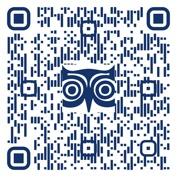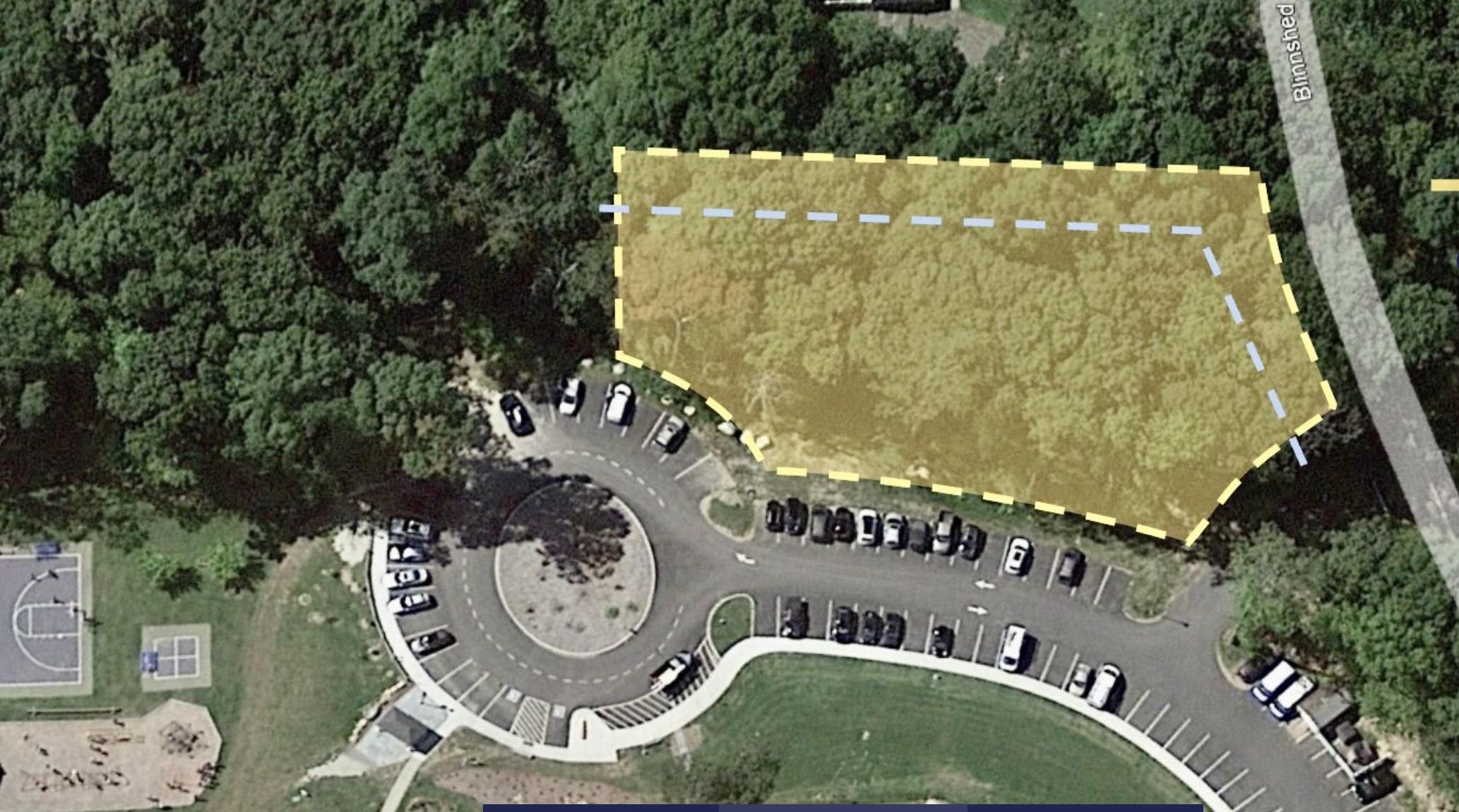






For the past 68 years, Country School teachers have created lessons with the school’s core values–learning with love, autonomy and self-advocacy, belonging and community–as their guiding principles. These academically rigorous lessons continue to deliver more than content knowledge; they help build confident, self-advocating students.
This issue of Country Connections celebrates the teachers who craft inspirational lessons that spark our students’ varied interests, who turn every interest into an opportunity, who encourage their students to use their voices to become active and explorative learners, who allow their students to learn without limits, who value and understand their students’ individual strengths and challenges, and whose classrooms are filled with students who are joyful in discovery and knowledge. Open-minded and nurturing, Country School teachers allow their students to be themselves and to mature into human beings who are curious, confident, and unintimidated about their place in the world. Our teachers provide students with countless opportunities to take risks and make mistakes in a loving and safe community.
In preparation for this issue of Country Connections, Country School teachers were asked to reflect on the past academic year and to share their most successful and memorable
lessons of study, lessons that exemplify how Country School is a world built for students so they can take on the world. You will find lessons that touch upon our school’s three simple rules: “Be kind to others,” “Respect everyone’s right to learn,” and “Take responsibility for yourself and your world,” as well as lessons that weave in our Signature Programs of Elmore Leadership, Global Citizenship, Outdoor Education, Public Speaking, and STEAM. Country School teachers know their students well and deliver an educational experience second to none.
Peruse this issue and marvel at our teachers’ utter creativity, how they put their students first, how they set the academic bar high, and how they present memorable and meaningful lessons. Whether performing in front of an audience or working independently, bringing history to light or exploring Africa’s biomes, Country School teachers provide varied and authentic learning opportunities for all their students.
Thanks to our teachers, a Country School education cultivates a love of learning that our students carry into the rest of their lives. On our 23-acre campus of forest and fields, students have the freedom, resources and support to blossom into engaged, confident and bright adults, ready to face the world with confidence.
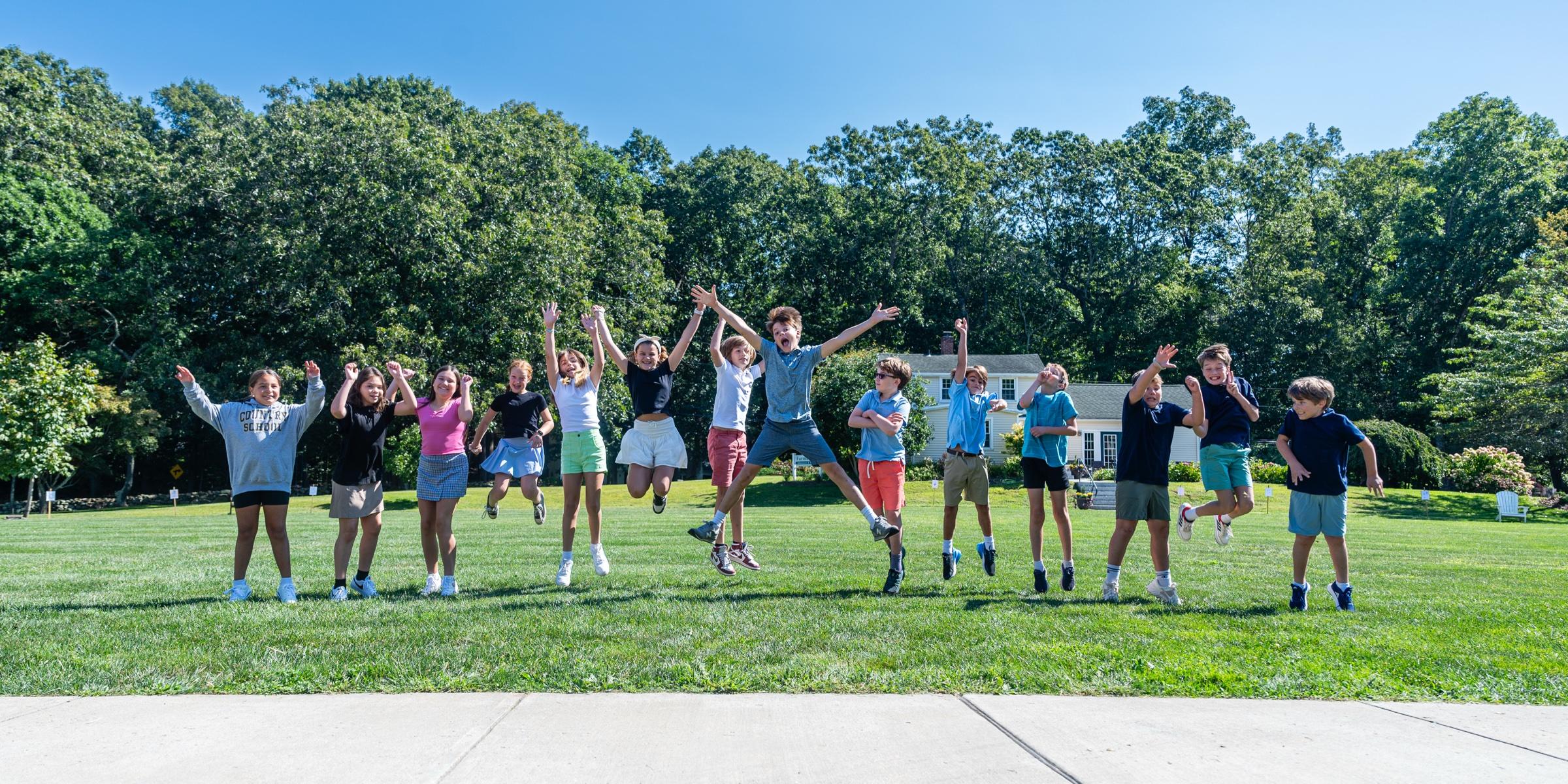
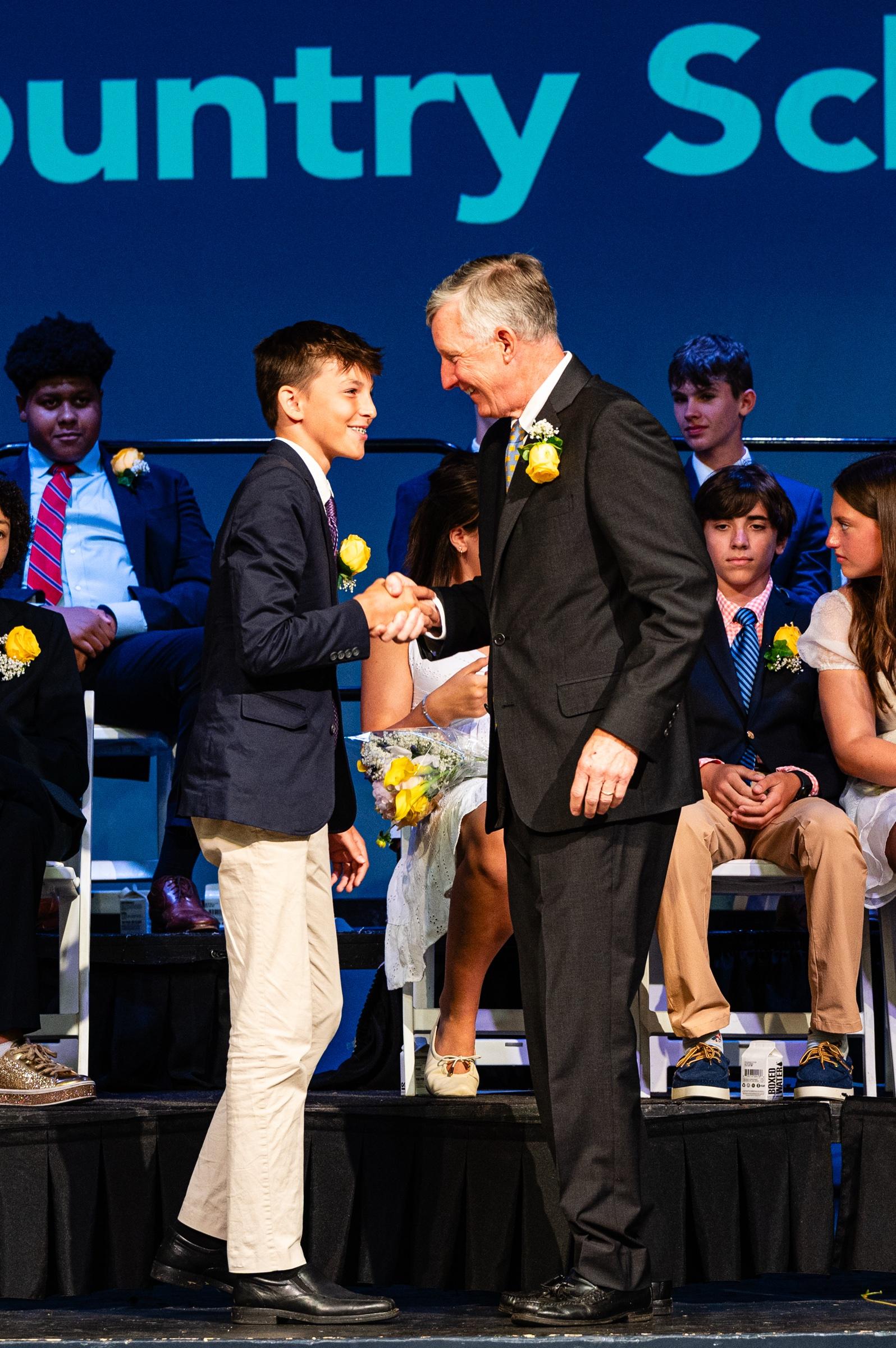
Dear Country School Community,
I’m delighted to welcome you to this edition of Country Connections, which brings together stories and updates that highlight life at The Country School. Whether it’s the excitement of students learning both in and out of the classroom, the success of alumni in various fields, or the pride parents feel in their children's achievements, Country Connections seeks to unite us through these shared experiences.
My thanks go to Teresa Sullivan, our Director of Marketing and Communications, for her work in pulling this issue together.
As Head of School, I often reflect on the small miracles that define the world of independent schools. And as we approach The Country School’s 70th anniversary, I’m especially reminded of the miracle that began nearly seven decades ago.
It was just two or three generations ago that the families of 14 children gathered in a living room with a shared vision—a dream to start a new kind of school—one in which the children were at the center of learning and the teachers were astute facilitators.
Those founding families could not have imagined that their small idea would grow into the vibrant community we have today: 33 acres on Opening Hill Road in Madison, where more than 200 students from age three through 8th Grade explore, learn, and thrive. Our founding families couldn’t have foreseen the dedicated teachers, administrators, and staff members who have graced this school with their talents and passion—nor the countless lives they have touched. And they certainly couldn’t have predicted the many graduates who have gone on to impressive success in secondary school, college, and beyond.
What makes The Country School special is the sense of continuity—a legacy of excellence passed from one generation to the next. Each of us, whether a student, teacher, parent, or alumnus, plays a part in this ongoing story. Together, we not only preserve the excellence that has made us great but also push forward, seeking new ways to inspire and educate.
As I read through the pages of this issue, I’m struck by the remarkable talents of our teachers, the support and generosity of our families, and the joy our students bring to learning every day. Country Connections is a celebration of all that makes The Country School such a wonderful place—a community where miracles truly happen.
As you enjoy this edition, I invite you to share in the joy we all feel in being part of this unique school at 341 Opening Hill Road. The miracle of The Country School is alive and well, and it’s all thanks to the dedication and love we each contribute.
Warmly,

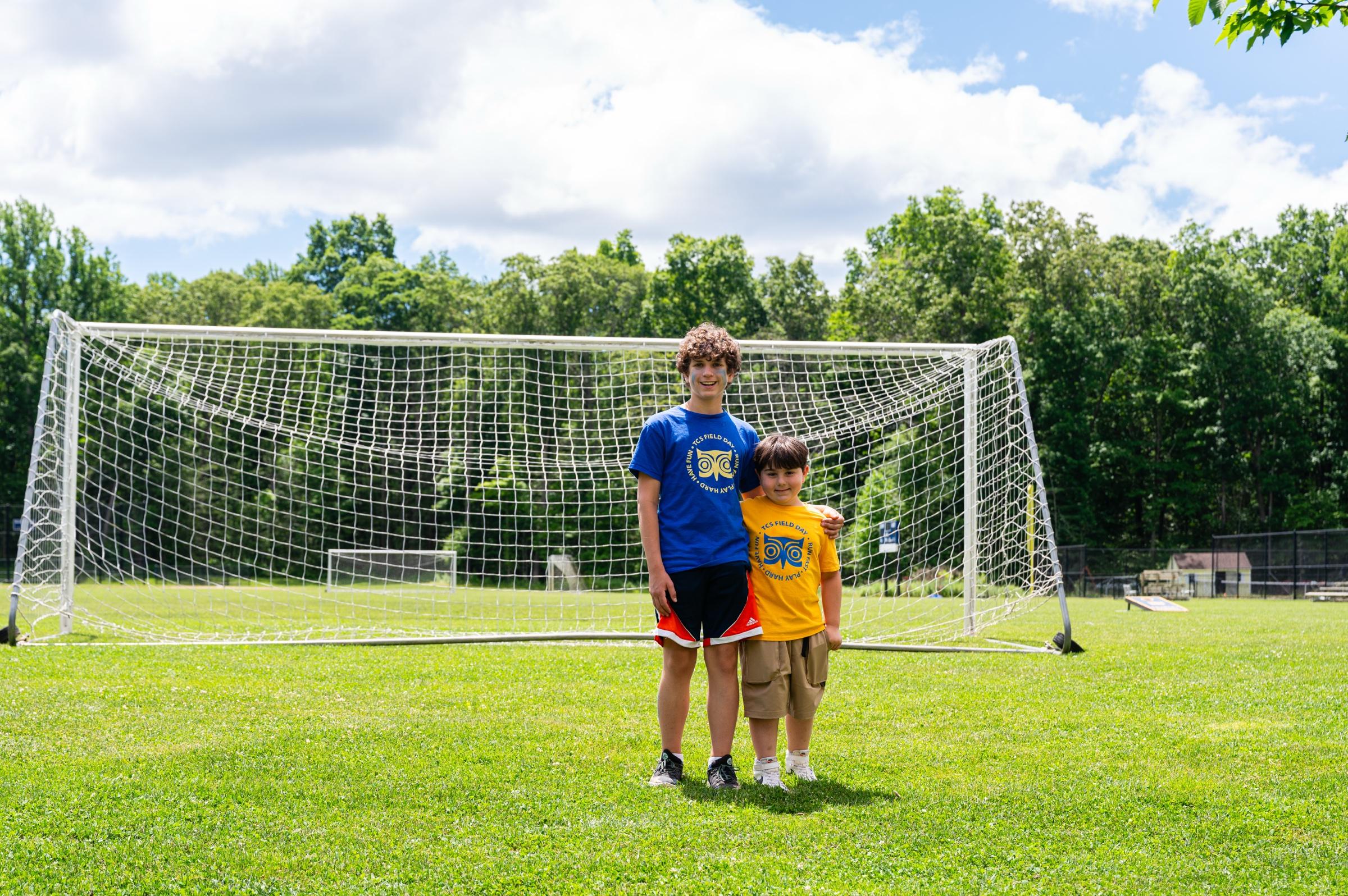
The Country School continues to enjoy healthy enrollment, PreSchool through 8th Grade. Students commute from 21 towns, as far west as Ansonia, as far east as East Lyme, and as far north as Middletown. Parents stem from all over the world and 16 languages are spoken in their homes. Our beautiful diversity is celebrated throughout the year and is on full display at our annual potluck Multicultural Dinner. We are especially delighted when former students return to the area and enroll their children in their alma mater. This year The Country School student community boasts six alumni children and one grandchild.
The admission office has seen an increase in inquiries over the past few years. We attribute this to our investment in digital marketing efforts as well as the school initiative to use our campus to serve the public. Local sports organizations use our fields and tennis courts, we open up summer camp offerings to the community at large, and as a result of our partnership with RJ Julia’s Booksellers, we have hosted hundreds of people on campus for author events. Bobby Flay, Jann Brett, Delia Owens, and, most recently, Hoda Kotb joined a long list of authors who have shared their books from the DeFrancis Gymnasium stage.
Inquiring families are drawn to our student-centered philosophy, rich curriculum, and Signature Programs: STEAM, Public Speaking, Outdoor Education, Global Citizenship, and Leadership. When touring campus, visitors are impressed by the active, hands-on learning taking place as well as the engaging interactions between students and teachers. Families are also taken by the beauty of campus with its outdoor classrooms, athletic fields, tennis courts, playgrounds, Children’s Garden, orchard, and, our most recent addition, the greenhouse. The Burt Family Green, at the heart of campus, is a daily gathering spot for community members and conveys a sense of community even when empty.
Hope to see you on campus soon, Pamela Glasser, M.Ed, P '09, '11 Director of Admissions
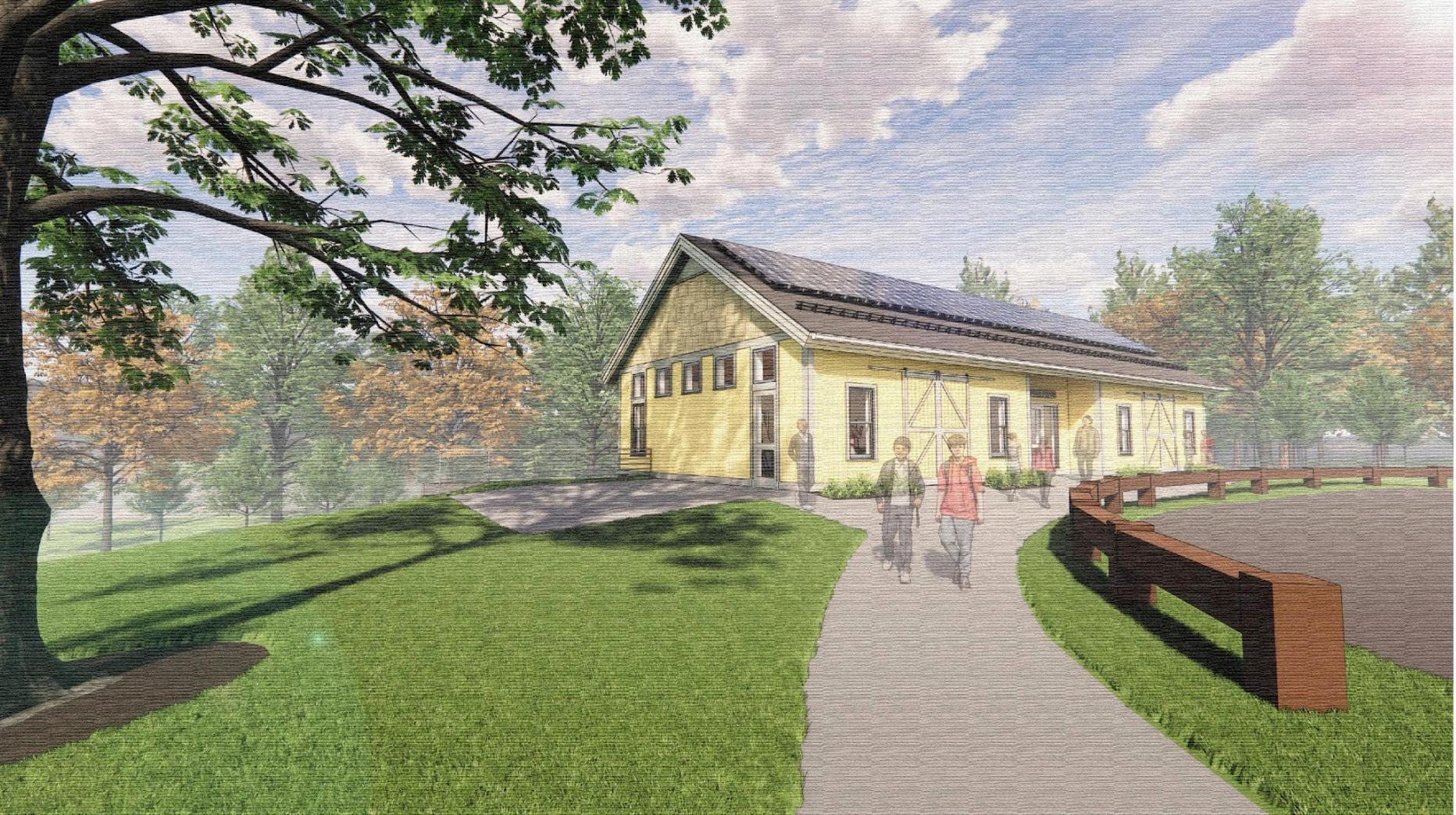
Picture This! A rendering of our Makerspace and Engineering Facility.
During this eventful run up to our 70th Anniversary celebration two years from now and the Talent Within Campaign, The Board of Trustees is committed to donating and attracting record levels of generosity for the school’s Annual Fund, our newest capital project—the Engineering Facility and Student Makerspaces—and our Endowment.
With the generosity already of over 50 donors, the Board of Trustees and the Development Of have been building the nucleus fund for a new classroom building on campus that will encompass, on the top floor, two new student STEAM spaces placed on top of a comprehensive maintenance center to protect and prolong the School’s assets and provide more appropriate space for the facilities team to work.
This year’s generosity included the largest-ever $500,000 gift in the form of a challenge to all those in our community, helping us reach a new high point for yearly contributions. The $500,000 and so many matching gifts it is still generating are being placed in endowment and will provide support forever for teacher compensation, student scholarships, and our academic program.
In celebration of the 70th Anniversary of the school, an anonymous donor pledged the $500,000 to inspire other supporters of the independent school to donate $1 million. The Country School is in the midst of earning that full challenge gift of $500,000 by attracting the additional $1 million.
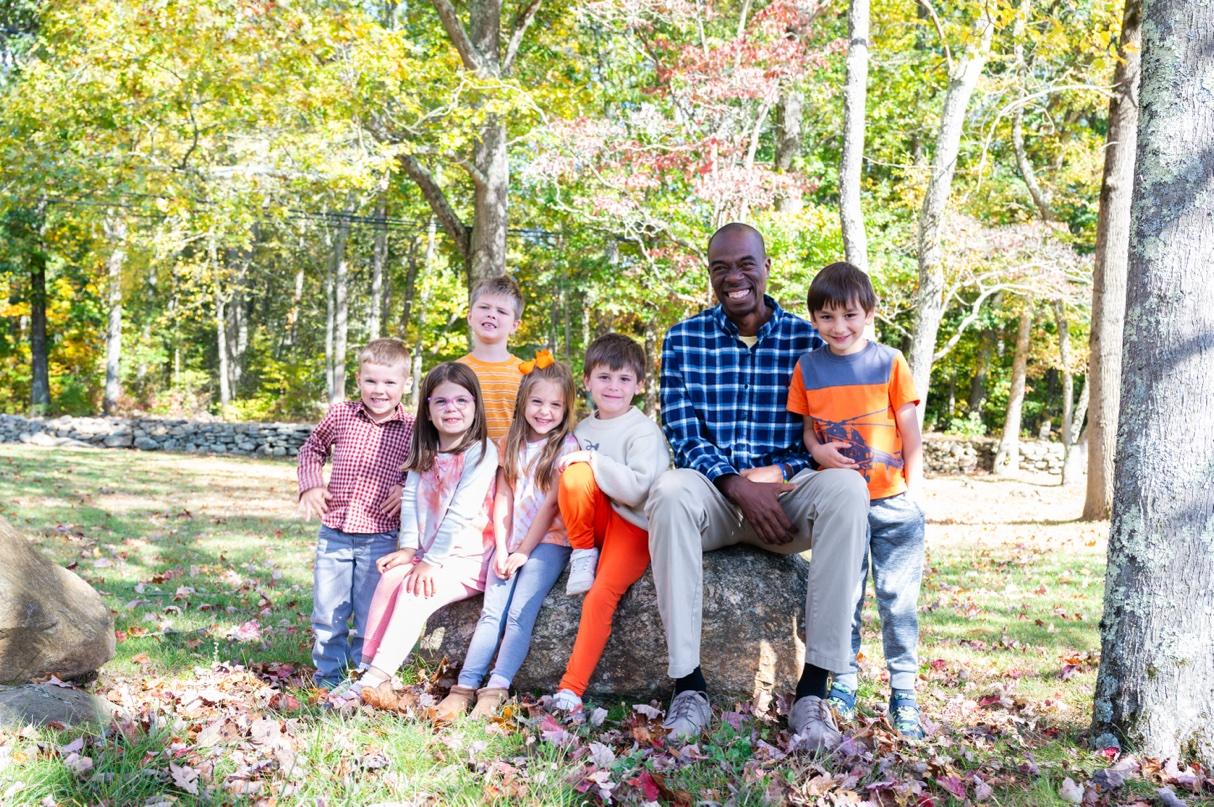
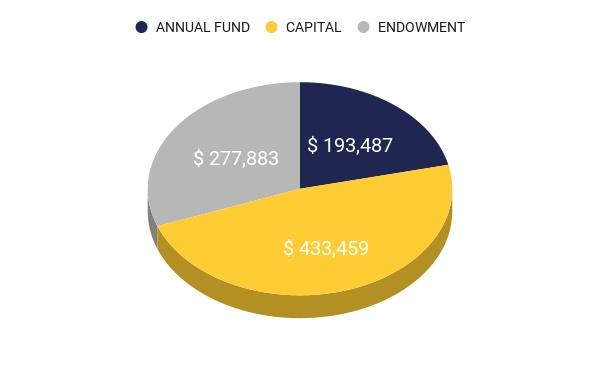

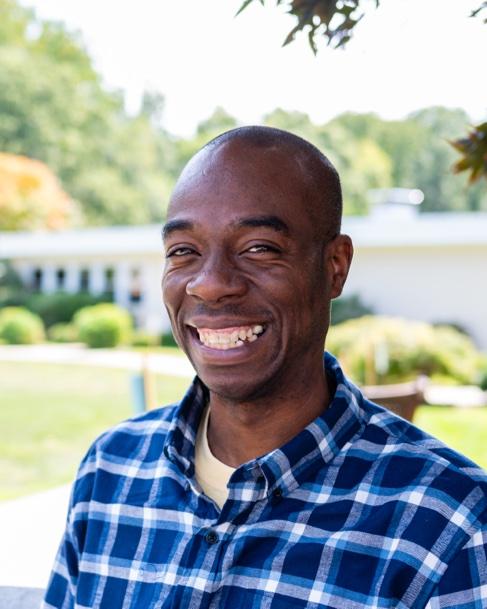
Hello there! My name is Christian Vick, I am the new Development Director at The Country School. I joined our community in early September and have enjoyed a warm and passionate welcome from this community.
Over the course of the 2024-2025 academic year, I will be focused on the future, the dreams of our school, and our enrollment. The Annual Fund, the Endowment Funds, the Spring Gala, Grandparents and Special Friends Day, the PTA, and the 8th Grade Legacy Gift will be my areas of emphasis. Of special note is a local alumni event we will be hosting this December. Stay tuned as we are finalizing the details now.
As many know, The Country School is also currently engaged in the transformative Talent Within Comprehensive Campaign to finalize a new engineering building that will serve as both a makerspace for our students and a work space for our dedicated facilities team. This building will be vital to the future of the institution and the advancement of our students. The Board of Trustees, John Fixx, others, and I will be working intently to bring this campaign in for a landing and move the school forward in a dynamic way.
I sincerely hope to meet as many of you as possible over the course of this academic year, so look for my outreach through email or even a phone call. If you visit The Country School in the interim, I am the tallest person on campus, so you should have no problem finding me!
As part of the PreSchool’s year long theme All About Me, the students' teachers, Mrs. Halsey, Mrs. Nelson, and Mrs. Treat, challenge their students to look beyond themselves and to learn about their classmates. From reading a variety of books touching upon the theme that we all come from a variety of cultures, PreSchool students are encouraged to share a favorite recipe with their peers. The PreSchool teachers find the students benefit from the exposure to different traditions and cultures other than their own and that sharing a bit of themselves with their classmates and teachers promotes self esteem and confidence. They take pride not only in having their parents “teach” their class but also in trying new foods.
Country School is all about community, and so it is no surprise that there is such tremendous parent involvement. Parents have the choice to either send in a video of them preparing their favorite meal with their child at home, or they visit school and prepare it with the class. Either at home or in the classroom, students help prepare the meal by reading the recipes, reviewing necessary cooking tools, cutting, stirring, mixing, measuring, and serving.
Math and science are woven into the unit as children make predictions, read recipes, measure, count, and keep track of cooking time. Students naturally and organically dive into asking very science-oriented questions, joyfully make predictions, note outcomes, practice trial and error, and adopt new science content vocabulary. This unit encourages scientific inquiry in a very organic way. Beyond the Three Rs, the PreSchoolers practice important life skills, manners, and public speaking while sharing their recipes and fielding questions, washing and drying the dishes, and serving and receiving the meals.
As the culminating activity for this unit, the students make and share their own book about their favorite foods. This tangible reminder of the unit gives students the opportunity to revisit this positive experience and talk about it all year long.
Mrs. Halsey, Mrs. Nelson, and Mrs. Treat provide the PreSchoolers with a unit full of authentic learning, a lesson that celebrates and honors their students’ differences.
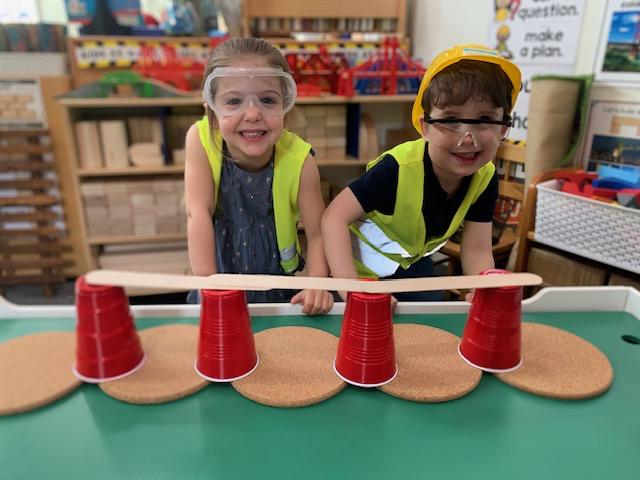
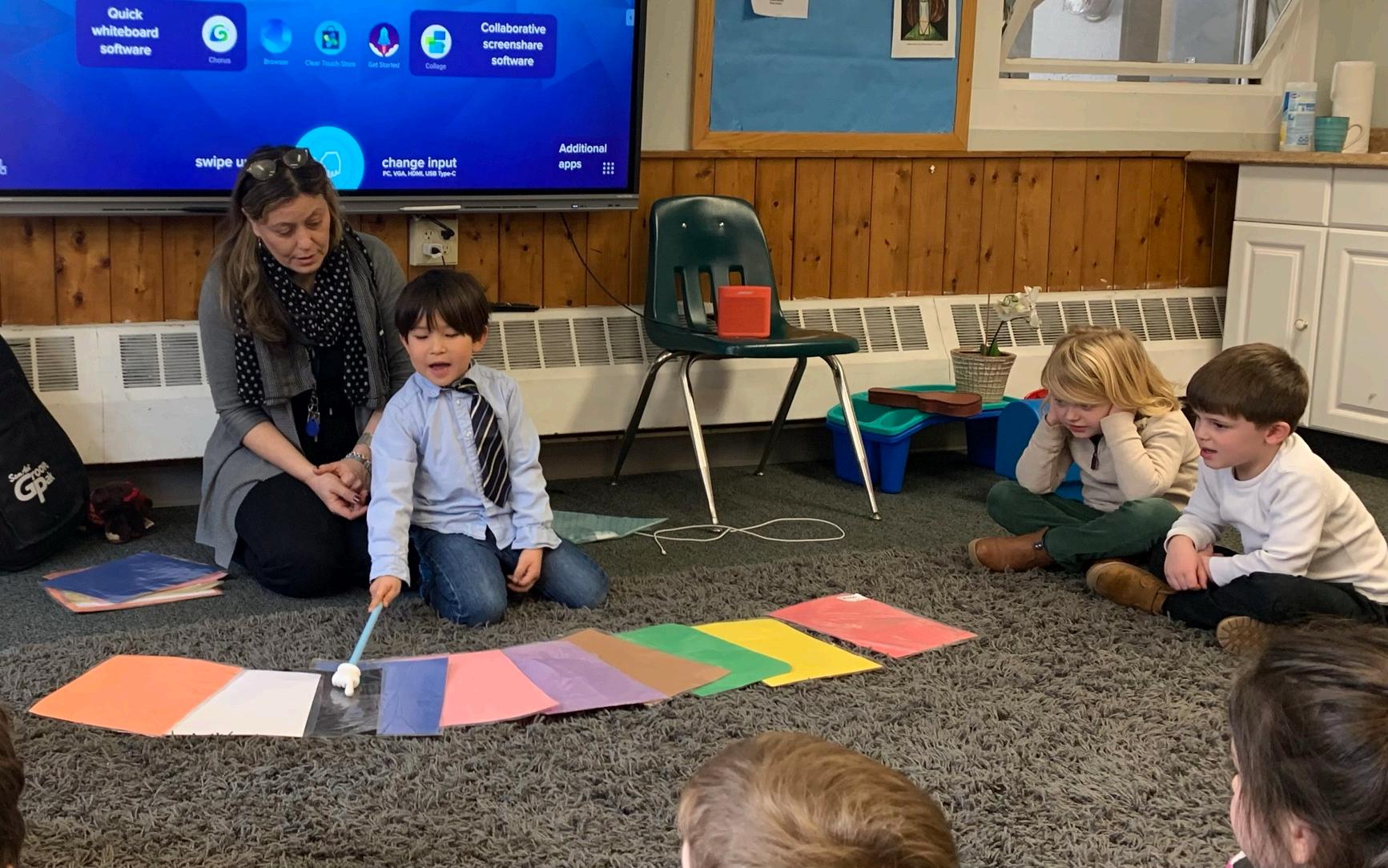


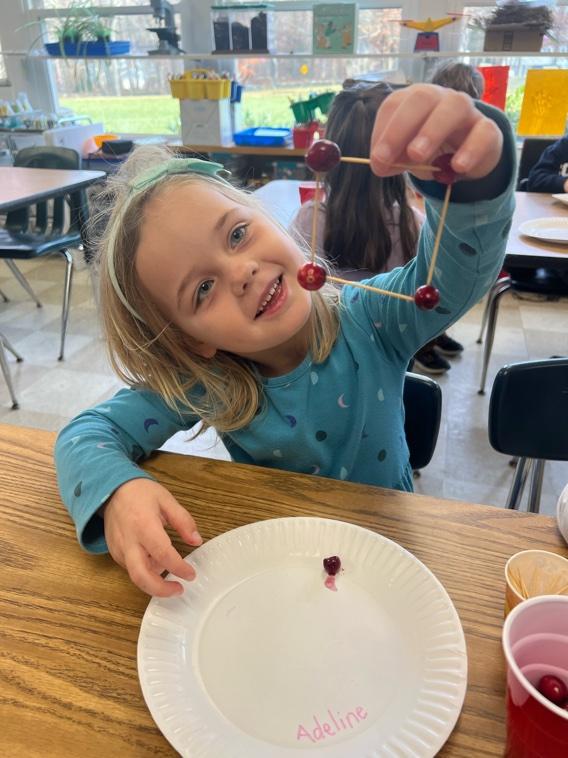
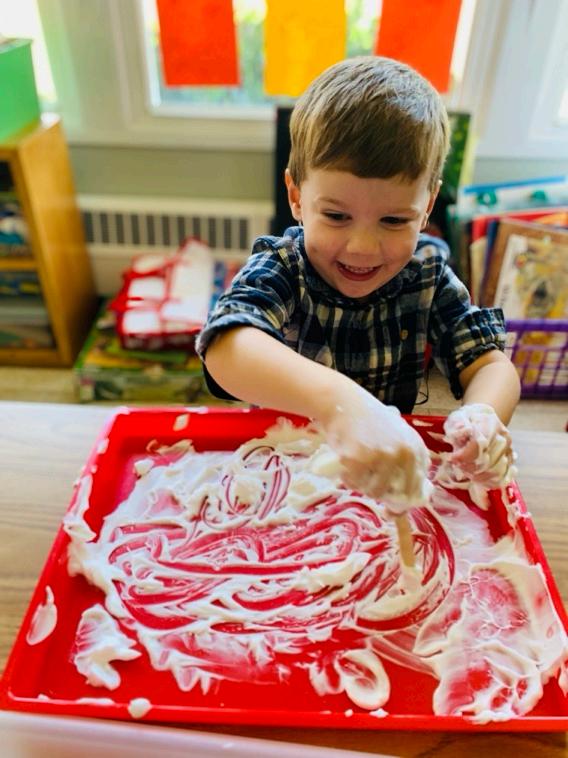
It is fascinating to watch the growth and development of young children, to embrace the similarities and differences of all students, and to set them up for a positive and successful school experience by planning with thoughtfulness and intentionality. One of the most important elements to this planning–and many might argue the most important element–is play. The tremendous impact that play has on every young child’s life cannot be underscored enough.
PreKindergarten teachers Mrs. Hard and Ms. Chiaia, and assistant teacher, Ms. Helsel know and believe strongly that quality play, in a variety of forms, is essential for helping children learn firsthand about themselves and their world. Through activities like building with blocks, sorting objects, and using tools like tongs or tweezers, children are not only exploring math, literacy, and science concepts but also strengthening their fine motor skills. Knowing that play builds imagination and creativity, fosters cognitive growth, delivers emotional and behavioral benefits, and encourages independence, Mrs. Hard, Ms. Chiaia, and Ms. Helsel purposefully set up areas in their classrooms: stations of blocks, housekeeping, sensory table, and music, and they craft lessons and games that encourage children to identify patterns, do math, communicate, and articulate what they are doing.
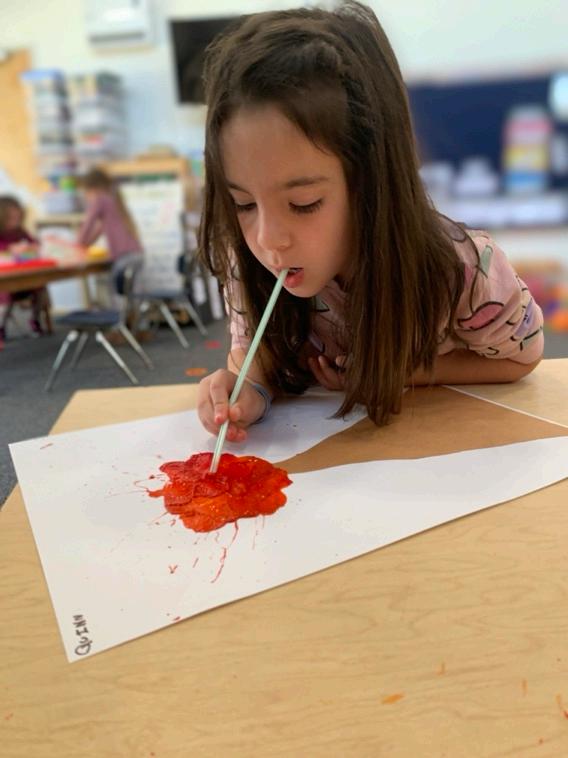

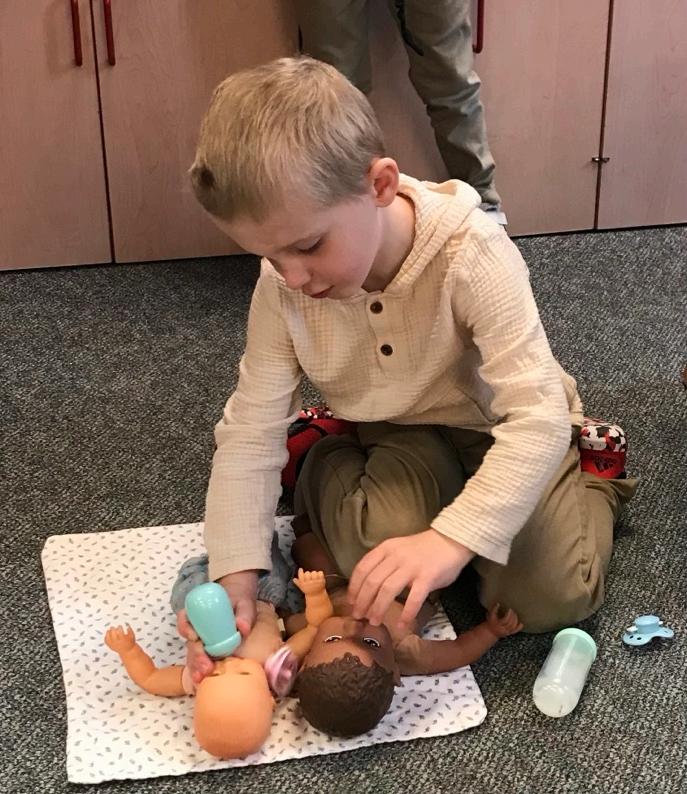
The three stages of play–solitary, parallel, and cooperative–provide different opportunities for growth. In solitary play, children develop independence and problem-solving skills. Parallel play allows them to observe and learn from others, fostering language development and creativity. Finally, in cooperative play, they collaborate, communicate, and build relationships. Together, these stages of play are crucial for enhancing cognitive development and laying the foundation for lifelong learning.
Despite the myriad benefits of play, these two veteran teachers have also witnessed how the educational approach to play has shifted through the years, noting that the value once placed on play has diminished and it no longer seems to hold the same importance today as it once did. Current trends show that play is now more often scheduled and that the majority of young children's activities are, by design, structured and programmed.
These trends have fostered an even greater resolve for Mrs. Hard and Ms. Chiaia to make sure that play is incorporated into many facets of their daily teaching. Believing that play is the foundation of their curriculum, they feel a strong sense of responsibility to educate the students while also helping parents understand the significance of play and the intentionality of what takes place in their children’s classrooms.

Gigi
Kindergarteners read “Ablaze with Color: A Story of Painter Alma Thomas” by Jeanne Walker Harvey. The students delved into the life of this remarkable woman who continuously shattered barriers, culminating in her historic achievement as the first Black woman to hold a solo exhibition at New York City's Whitney Museum. Alma Thomas's story served as an inspiring testament that there are no limits to what one can achieve, encouraging the Kindergarteners to challenge boundaries and make a difference in the world."
They explored her unique perspective and techniques more deeply by looking at several different examples of her work. The students talked about how Alma Thomas got ideas from nature for her art. Then, inspired by her colorful paintings, Kindergarten students used their imagination and expressed themselves through art, making bright collages with ripped construction paper and glue.
After being introduced to this artist, the students unleashed their creativity and crafted art with absolute freedom and without constraints. They were empowered to express themselves in whichever way they desired. Ask any Kindergartner at Country School what a “porcupine word” is, and they will quickly tell you it is a spiky word that does not make them feel good.
Jennifer
School Counselor Mrs. Butler recognizes the importance of modeling kindness for our youngest learners. Be Kind is Country School’s number one school rule, and although the message is a simple one, it can sometimes be forgotten temporarily. That’s where Mrs. Butler steps in and teaches the students where they are. In this case, she works with some of our youngest learners to teach empathy and thoughtfulness. She helps students to identify how they can become allies when they hear unkind words being used.
Mrs. Butler read both “Words Are Not for Hurting” by Elizabeth Verdick and a counselor-created social story called “Mateo's Word” that introduced the concept of the porcupine words (words that make people feel uncomfortable and many times feelings are harmed) and puppy dog words (words that make people feel comfortable and good inside) to the class. Beyond learning the definitions, the students became experts at determining porcupine versus puppy dog words in social scenarios, and they identified replies to say when they confronted with porcupine words, replies such as "That's not nice," "We don't say things like that here," and "Please don't say that again." After this lesson, Kindergarten students eagerly pointed out the characters in their books or their peers who used puppy dog words versus those who used porcupine words.
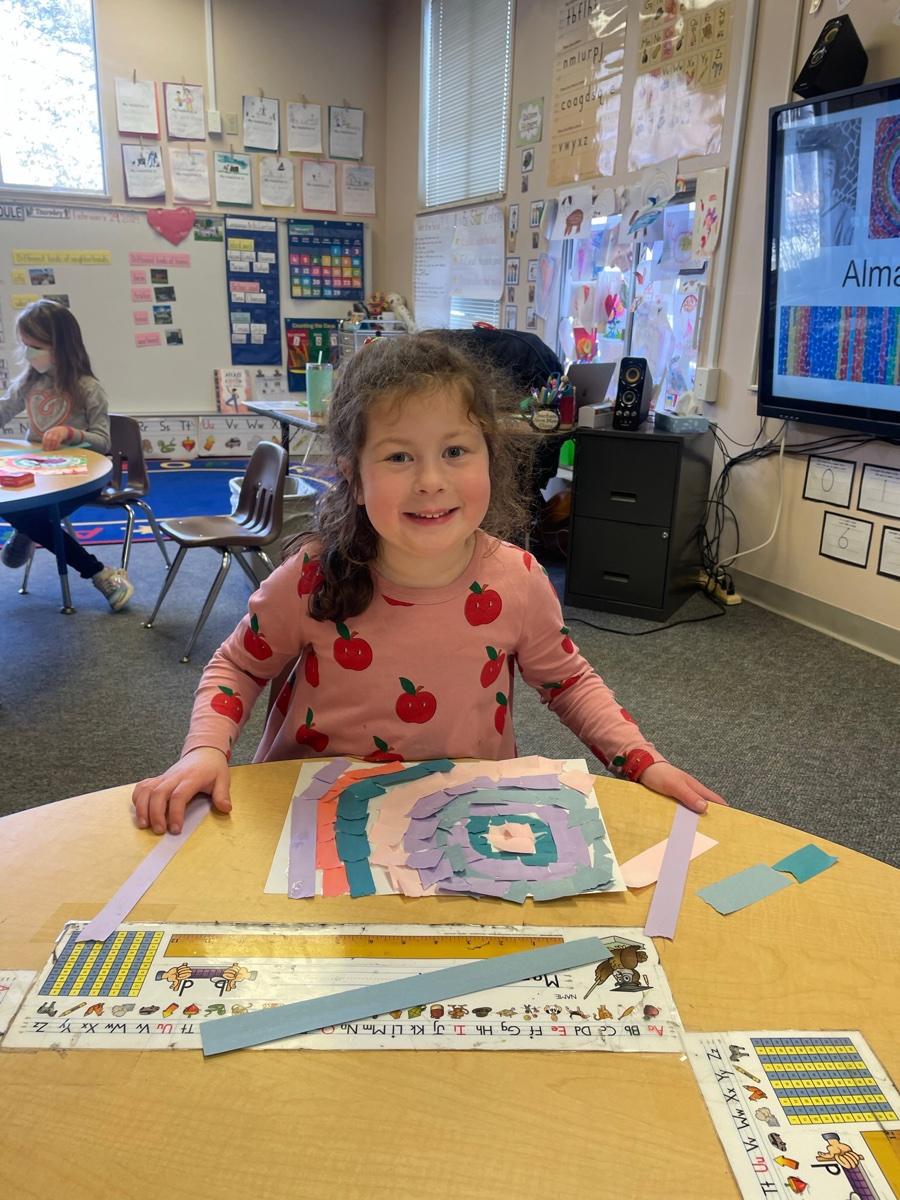
Coming together as a community, Mrs. Koenig’s 1st Graders performed “The Goodness Gorillas,” a play about kindness.
In preparation for their performance, the students practiced lines, cues, stage presence, and honed their public speaking skills. “The Goodness Gorillas” promotes respect for all members of a community; it’s a play that emphasizes the importance of being kind and how showing kindness engenders more acts of kindness in a community and beyond.
Beyond underscoring our number one school rule to be kind, this unit allowed Mrs. Koenig’s class to work together to make the play a huge success!
Sra. Mendez Keil’s 1st Graders spent the spring writing and illustrating “Los Tres Superhéroes,” their own short story in Spanish.
Given a basic storyboard, the children picked out nearly every element of the story including protagonist, antagonist, setting, and resolution. As the teacher and guide, Sra. Mendez Keil focused on helping her students incorporate key high frequency verbs such as giving someone something (dar- da), seeing someone (ver- ve), going somewhere (ir... in this case "va"), and liking something (gustar- le gusta) into their writing.
The final stories included the text in both Spanish and English so the children could read and reread it with the assistance of an adult or peer who may not be a native Spanish speaker. Each child contributed to the creation of the plot and illustrated a page. This unit provided the 1st Graders with a perfect opportunity to practice reading in a world language at the start and end of each lesson.
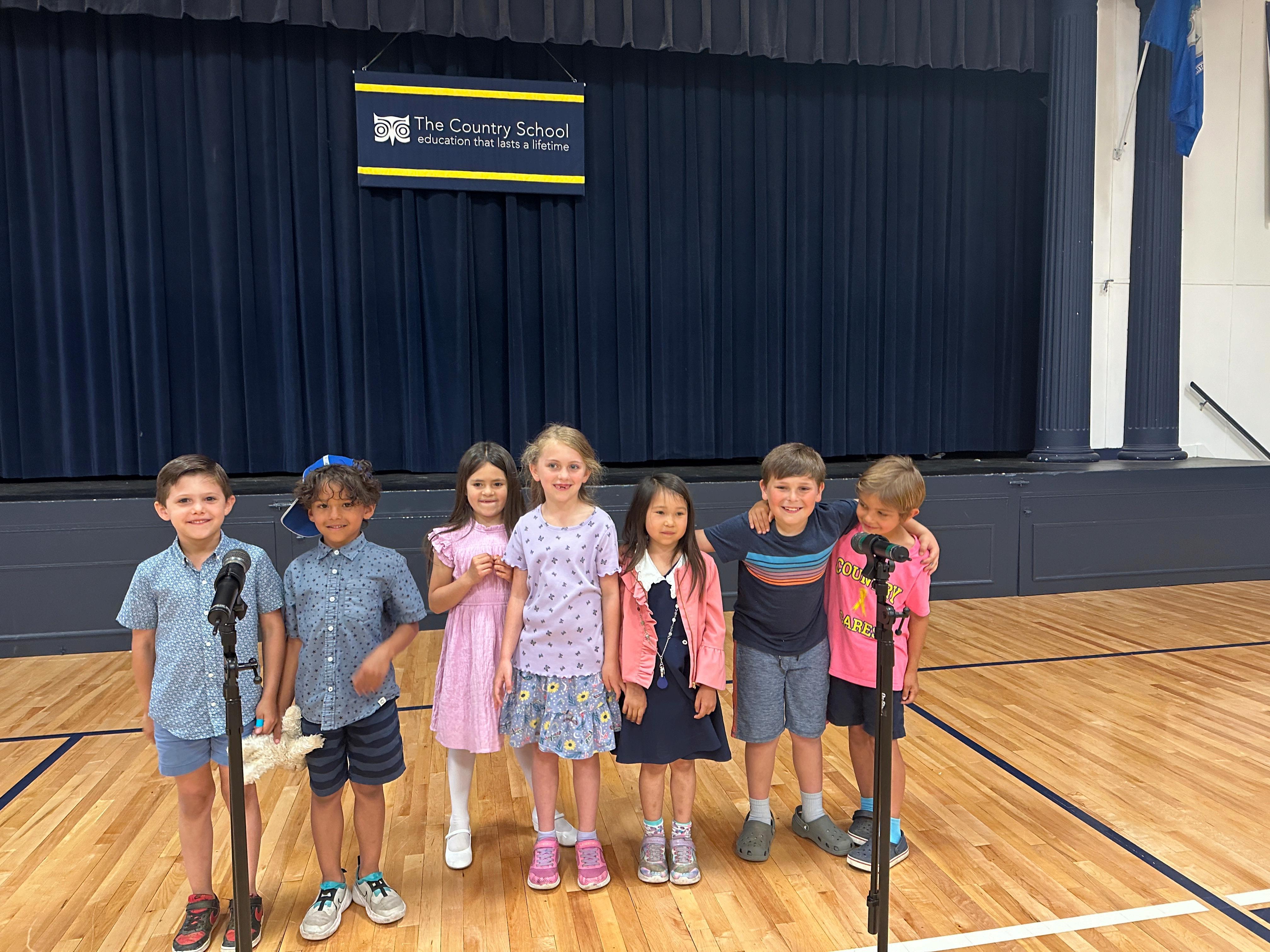
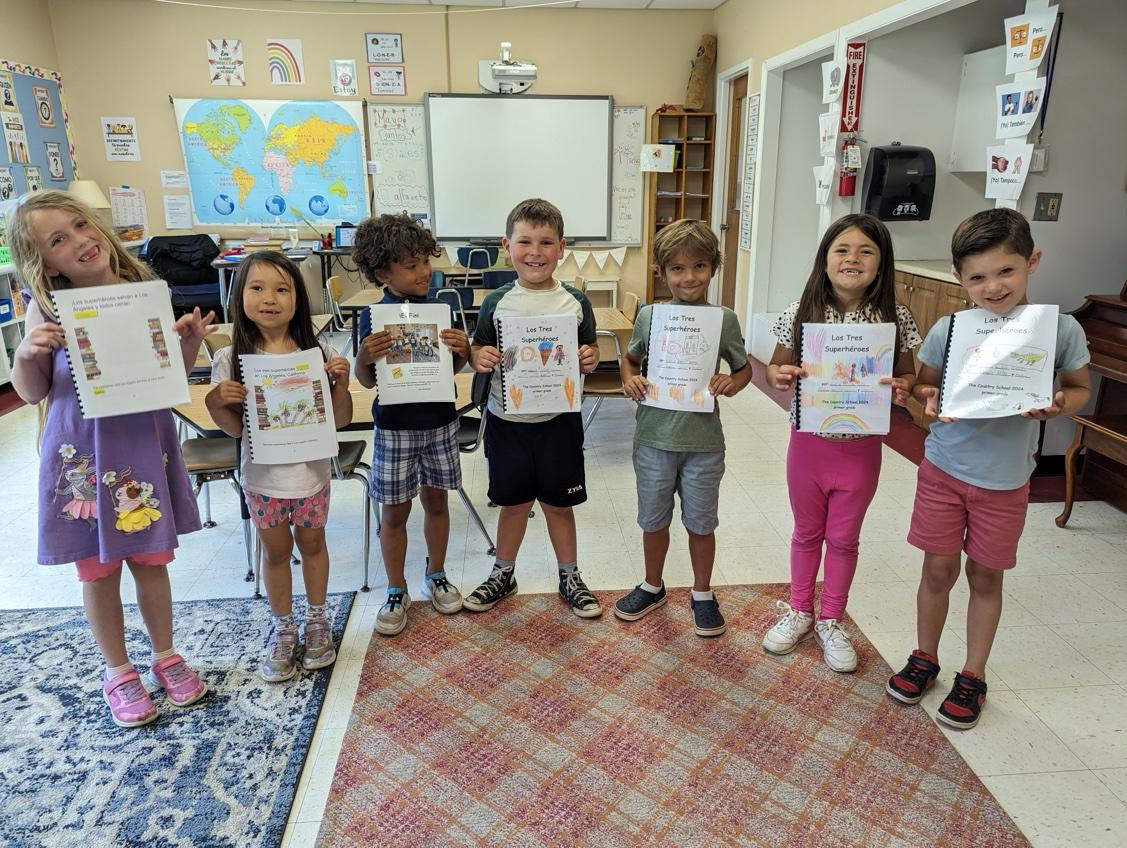

Vicki Wepler
“Who am I and Who Came Before Me?” is one of the 2nd Grade’s units of study. As part of that lesson, the students ask their families how they got their names. In music class, Mrs. Wepler read the book “Your Name Is A Song” by Jamilah Thompkins-Bigelow, about a girl who has a name that some of her peers find difficult to pronounce. This girl discusses this with her mother, who explains the beauty and history of her name and the importance of pronouncing it properly. Her name sounds like a song! Confidently, the girl returns to school and helps her peers learn to say her name.
The class discussed the themes of the story, and Mrs. Wepler taught them a vocal melody that uses words from the story. Then they connected the foundational components of note reading and intervals; each student wrote their name as a melody, and Mrs. Wepler put them all together to create one giant, unique song that they sang as a class.
This lesson serves many purposes: it makes a musical connection to learning about ourselves and our larger world, knowing how important it is to share names and pronounce them correctly. People matter, and so do their names. By using music as a way to communicate this important lesson, students connect to one another, look beyond themselves, and think about others.
In this multifaceted unit, 2nd Grade students learned about nonwestern cultures and their connection to STEAM. To start, they explored Africa’s topography, geography, biomes, plants, animals, and people, with comprehensive class lessons on the distinctive features of each biome and habitat. With this foundation, Mrs.
Exposito challenged them to use LEGOS to recreate one of seven African biomes, including the plants and animals native to each biome.
In addition, students paired up and explored science or engineering-themed picture books about Africa, paying special attention to the books’ themes, settings, and connection to science or engineering. Inspired, students next designed and executed their own engineering projects or experiments. These projects included creating bracelets out of plastic bags, building a water filter, constructing a windmill, and designing a pen for a valued goat.
This unit was further enriched with performing arts by studying African drumming, taking dance lessons, and emulating the style of famous African artists with their visual arts teacher, Mrs. Peters.
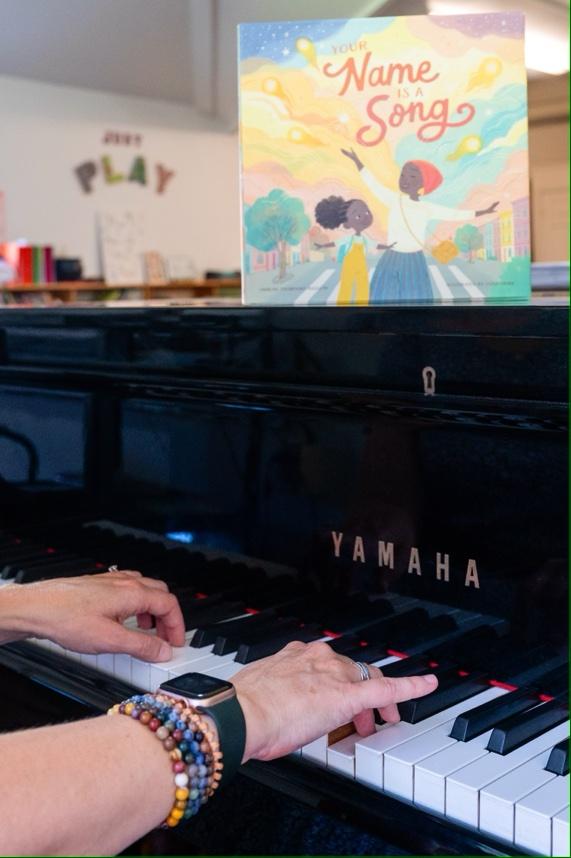
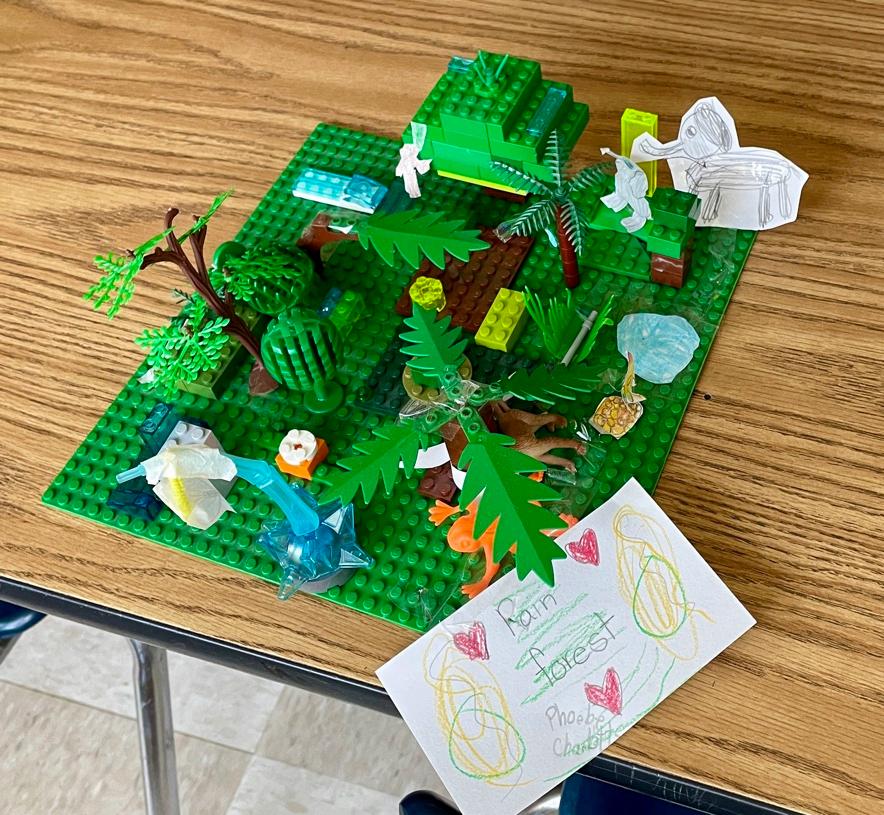

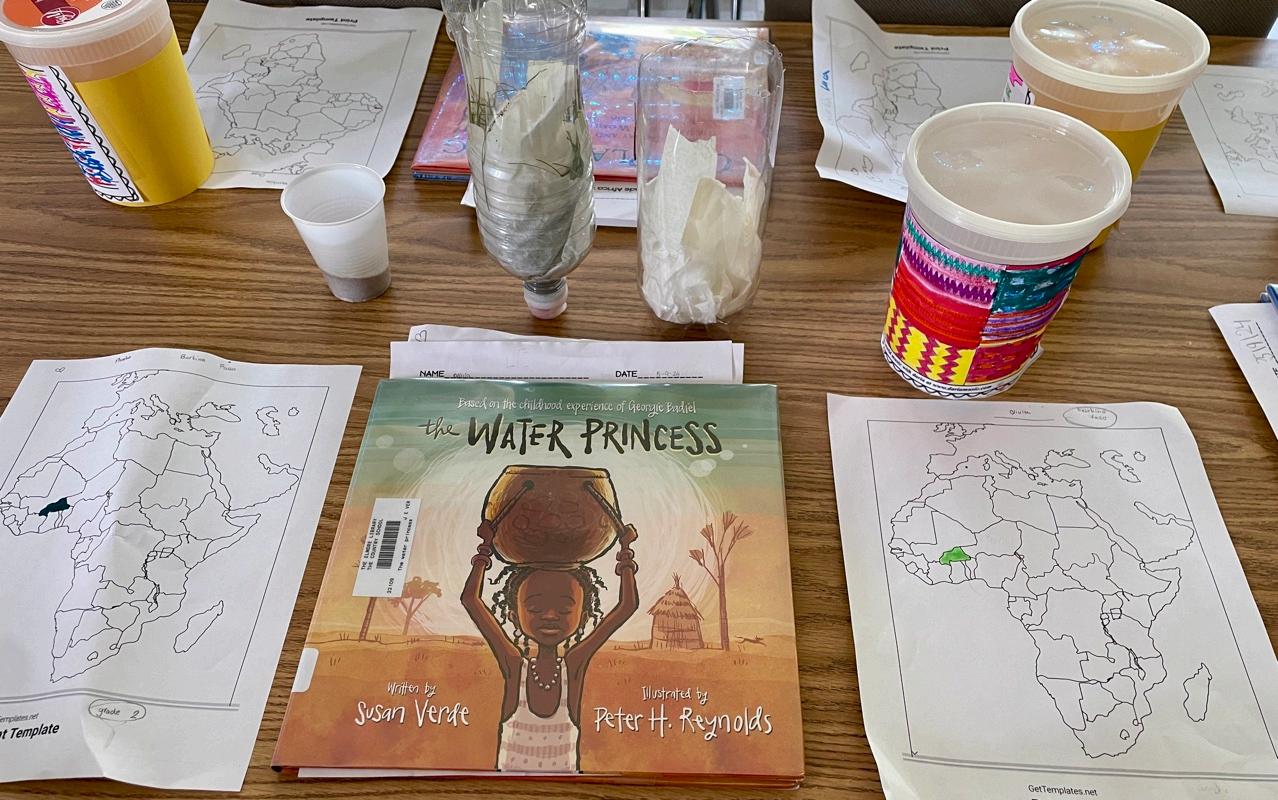
When you're eight and nine years old, adults don't always ask your opinion, so Mrs. Hurtgen’s students took this writing unit seriously. Knowing that their teacher valued their thoughts and feelings, these 3rd Graders learned how to put their thoughts down on a written page. They had many opinions, from “The best kind of candy is Twix” and “Gymnastics is better than any other sport” to “The Country School is the best school ever!”and they weren’t afraid to voice them. With great excitement and confidence, they shared their cursive written pieces and illustrations with each other and their families.
Writing is a necessary lifelong skill, and this unit on opinion writing taught these 3rd Graders that their opinions matter.
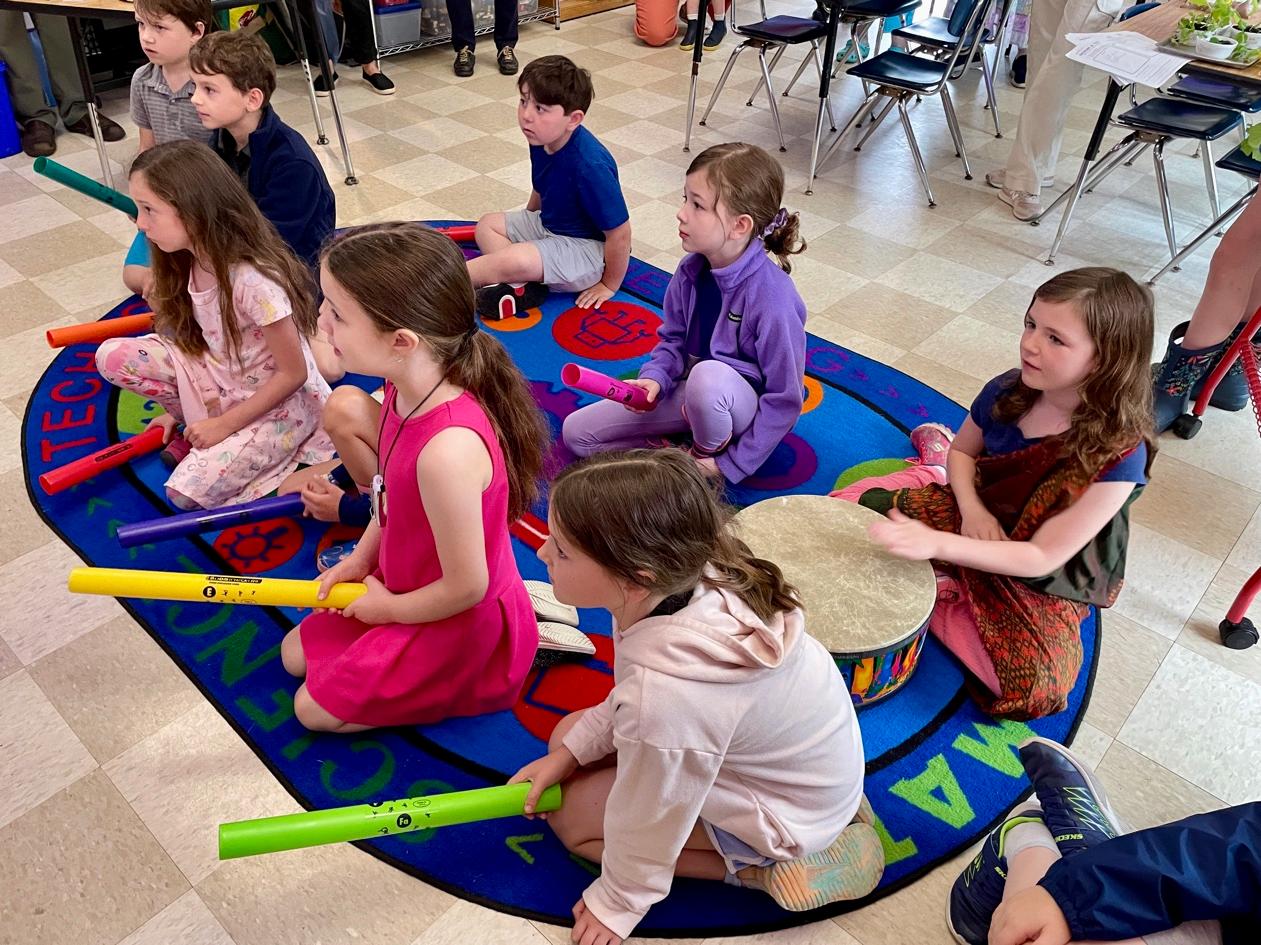
Fourth Graders’ natural curiosity is sparked by the story of Samuel Collier, a 14-year-old boy who arrives in Jamestown with the first group of settlers from England. His challenges, and the challenges all the settlers faced are so different from those of people today. The 4th Graders are astonished at what these people lived through. The lives of the Native Americans in Jamestown and the conflicts that arose with the introduction of the Europeans are so real to my students when they read about them through eyes of Samuel Collier, a child not much older than they are.

Highlights of this unit include creating replica forts on Tinkercad with Mrs. Liu in Elmore Library, investigating actual artifacts through the Jamestown Rediscovery website, and learning about the blending of three cultures (Native Americans, Europeans, slaves from Africa).
In this photo, the students are taking a virtual field trip with Mark Summers, one of the world’s experts on the Jamestown Settlement and leads the Jamestown Rediscovery project in Virginia. This virtual trip allowed students to see Jamestown today in real time, explore the sites they had read about, and witness archaeology in progress at one of the most active dig sites in the world.
“Les Aventures de Dandii”
Joelle Goetz
Comprehensible Input is a language teaching method that exposes students to content that's slightly beyond their current level of proficiency but still understandable. Mme. Goetz embraces this pedagogical approach with her Grade 5 French students by writing a book about their adventures with Dandii, a stuffed animal.
Every week, one of Mme. Goetz’s students took Dandii home, snapped three pictures of its escapades, and shared them with the class. Together they described the pictures and wrote a short caption for each. This student-centered unit capitalized on the students’ excitement and anticipation–who would get Dandii next? What would they have Dandii do? Where would they take Dandii?
This unit of study brought the students together as a community of learners. It gave each child a moment to share and practice their public speaking and leadership while discovering French spelling, reading a comprehensible text, and expanding their French vocabulary.
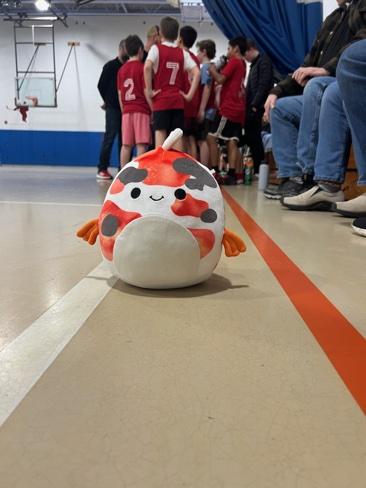
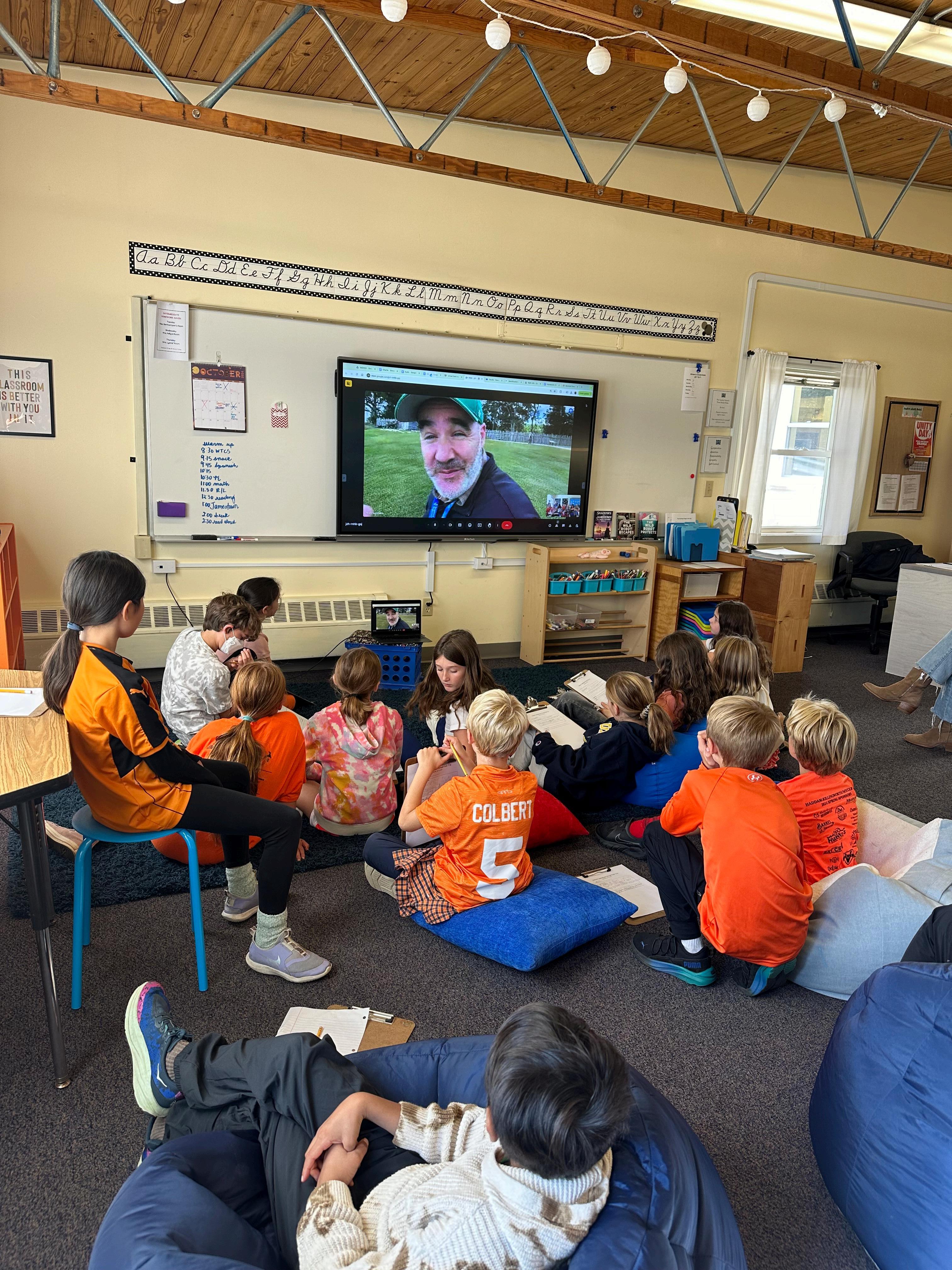

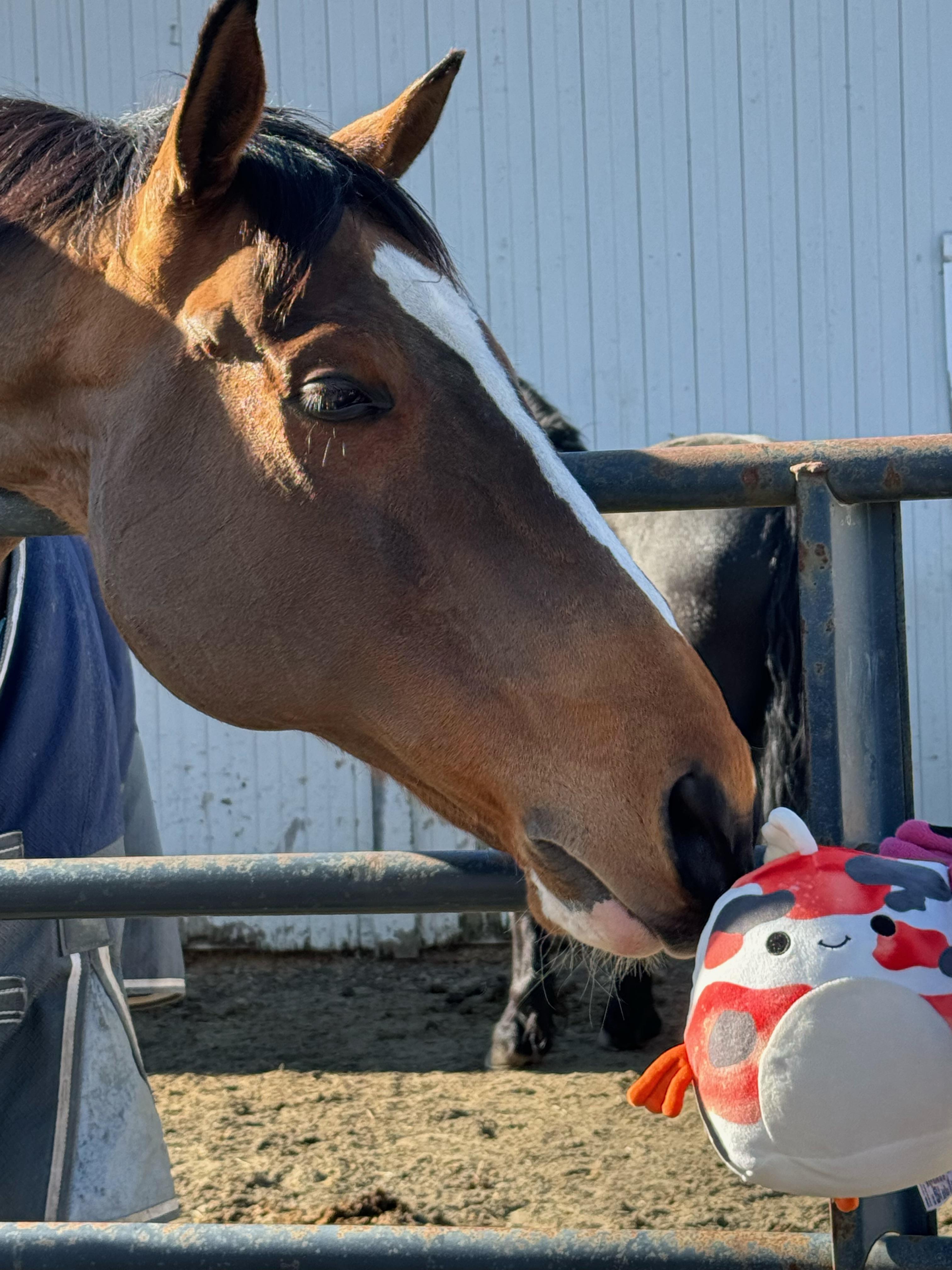


Kerri Kelly and Shannah Balogh
Class cooperation and teamwork are the hallmarks of the annual 5th Grade Play Greek Play, a culmination of a months-long study of Ancient Greece. After studying Ancient Greece in history class, the students read aloud the The Odyssey. They then turned the text into a script consisting of key acts that are revised each year by the class presently performing it. Country School 5th Graders have been performing this play with Mrs. Kelly for over 20 years. Presently, it is an outdoor performance in The Children's Garden and Country School is one of the only schools in New England that performs this epic tale on stage.
After reading the books, A Long Walk to Water by Linda Sue Park and Refugee by Alan Gratz, 5th Grade students dove into how their family members came to America. Students interviewed a family member, learned their story, and took a piece of it to create a picture book.
This lesson exemplified how Country School is a world built for students so they can take on the world. Learning more about the world of others, through the stories they read and from talking with their own relatives, helps them grow an awareness of other cultures and build empathy.
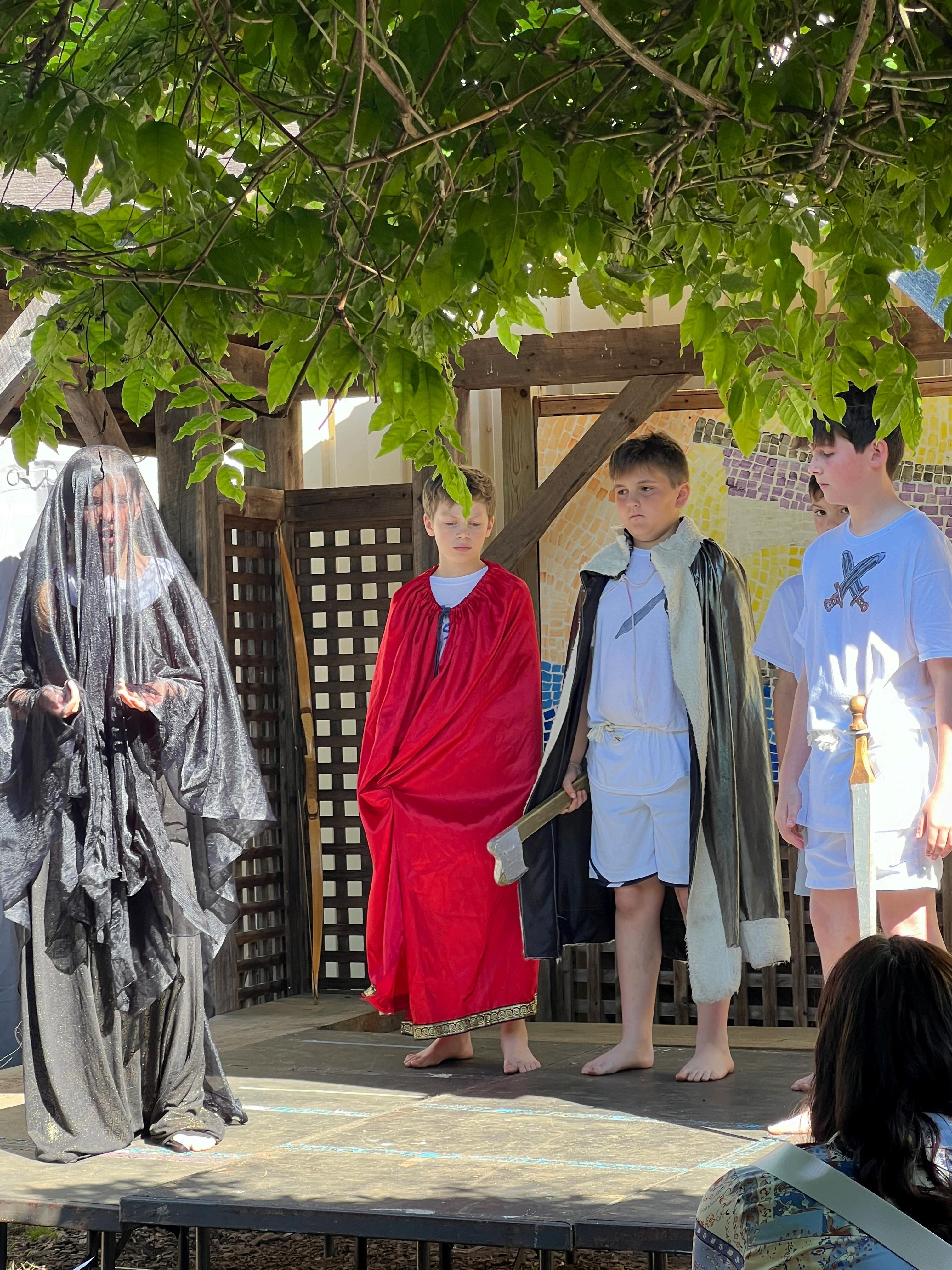
Students used research skills, writing skills (narrative diamond), art skills (created pictures that correlated/moved story events), and imagination in creating their own "publishing company," author's note, and overall end product. At the conclusion, the students enjoyed a ribbon cutting ceremony in
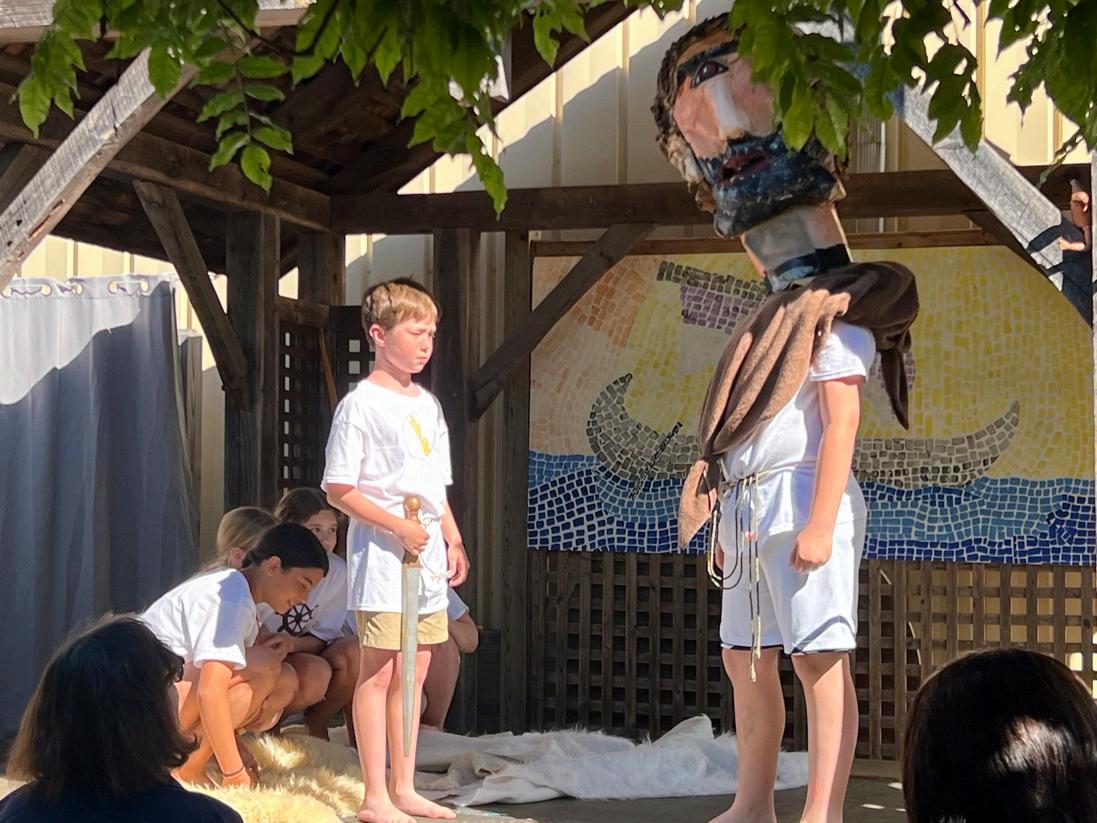
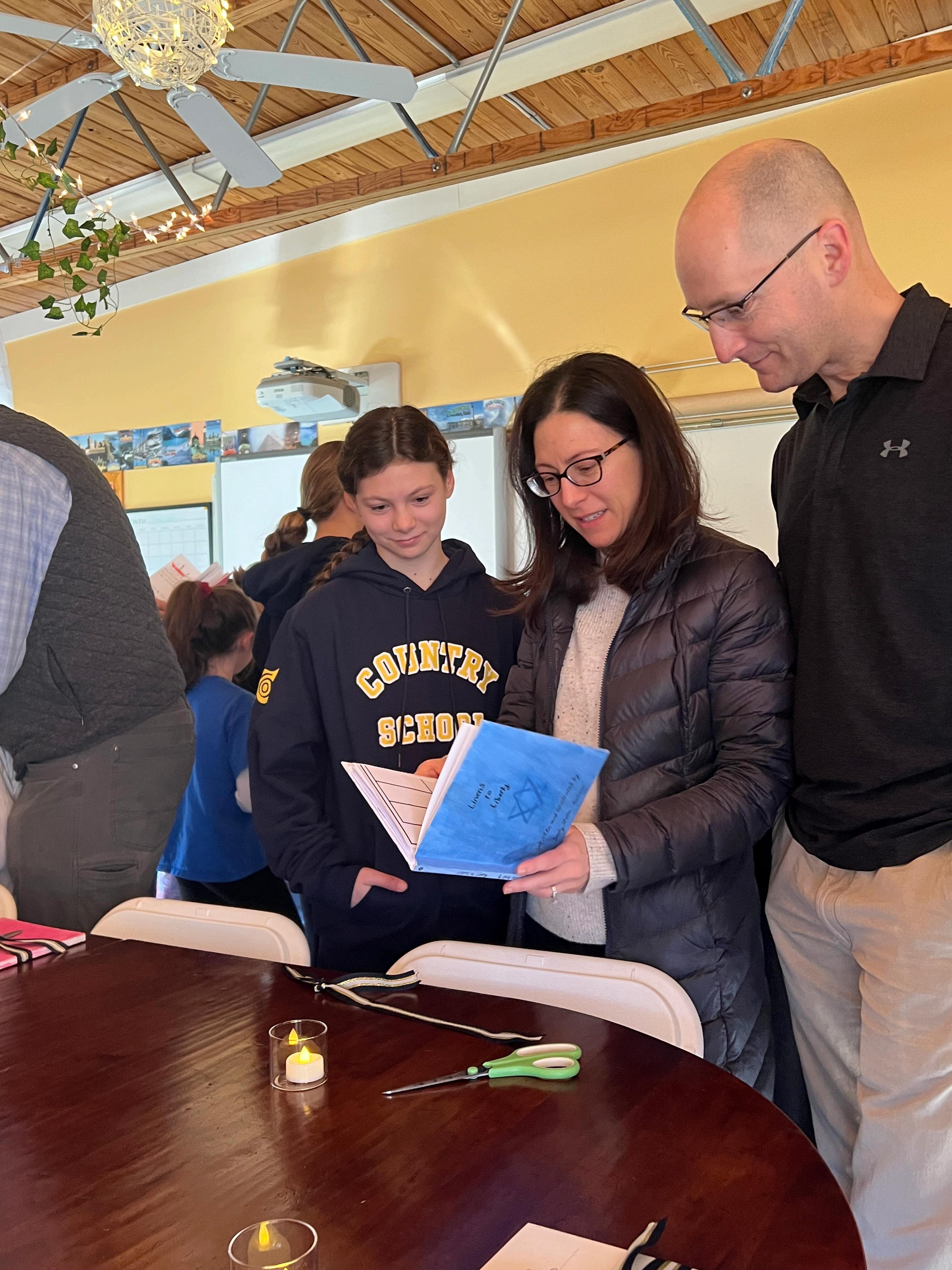

Giving students opportunities to take risks like learning something new together is important. For some students, just opening their mouth to sing can feel challenging. To help them out, Mrs. Wepler models for her students how trying something new is okay, can be fun, and doesn’t have to be perfect.
The music classroom has a book of A-Z melody tongue twisters. During warmups in chamber chorus, Mrs. Wepler picks a random student to give a letter, then she turns to that letter and the entire class all learn a new vocal melody tongue twister warmup together. The important factor is that Mrs. Wepler doesn’t learn the melody ahead of time, so they are all learning it together.
The students really enjoy this part of vocal warmup that builds vocal confidence and promotes a sense of trust as they build a community together in chamber chorus class. Explaining that even the teacher is learning the warmup with them takes the pressure off of getting it perfect the first time, and as they all fumble and learn together, they are connected as a group. The students trust each other more and look forward to learning something new every single class, as does Mrs. Wepler!
Most students love tech and games. They also love being creative and competitive. Using an interactive Desmos activity to explore the coordinate plane and linear equations allowed them the freedom to complete the objective their own way and share their strategies with a small group or the whole class.
Picture miniature golf, but on the coordinate plane! Students had to get all the balls into a series of holes, a task that became progressively more challenging. Mr. Merrill appreciates how the marble slide challenge can be used with a range of classes from those first being introduced to the coordinate plane as
well as those doing more complex linear equations. The extensions include limits to the domain and range in order to build the right ramping mechanism. This game can also be played with quadratics. “The sky's the limit, and it’s fun! It’s a win win!” said Mr. Merrill.
The nature of the lesson gave students hands-on experience and an opportunity to explore the coordinate plane and linear equations through trial and error and real time interactions. They learned the value of perseverance when they were faced with a challenge and worked independently and in groups to try to overcome obstacles. They were problem solving and constantly given scenarios in which they didn’t know the answer right away. They pushed through and came out stronger on the other side.
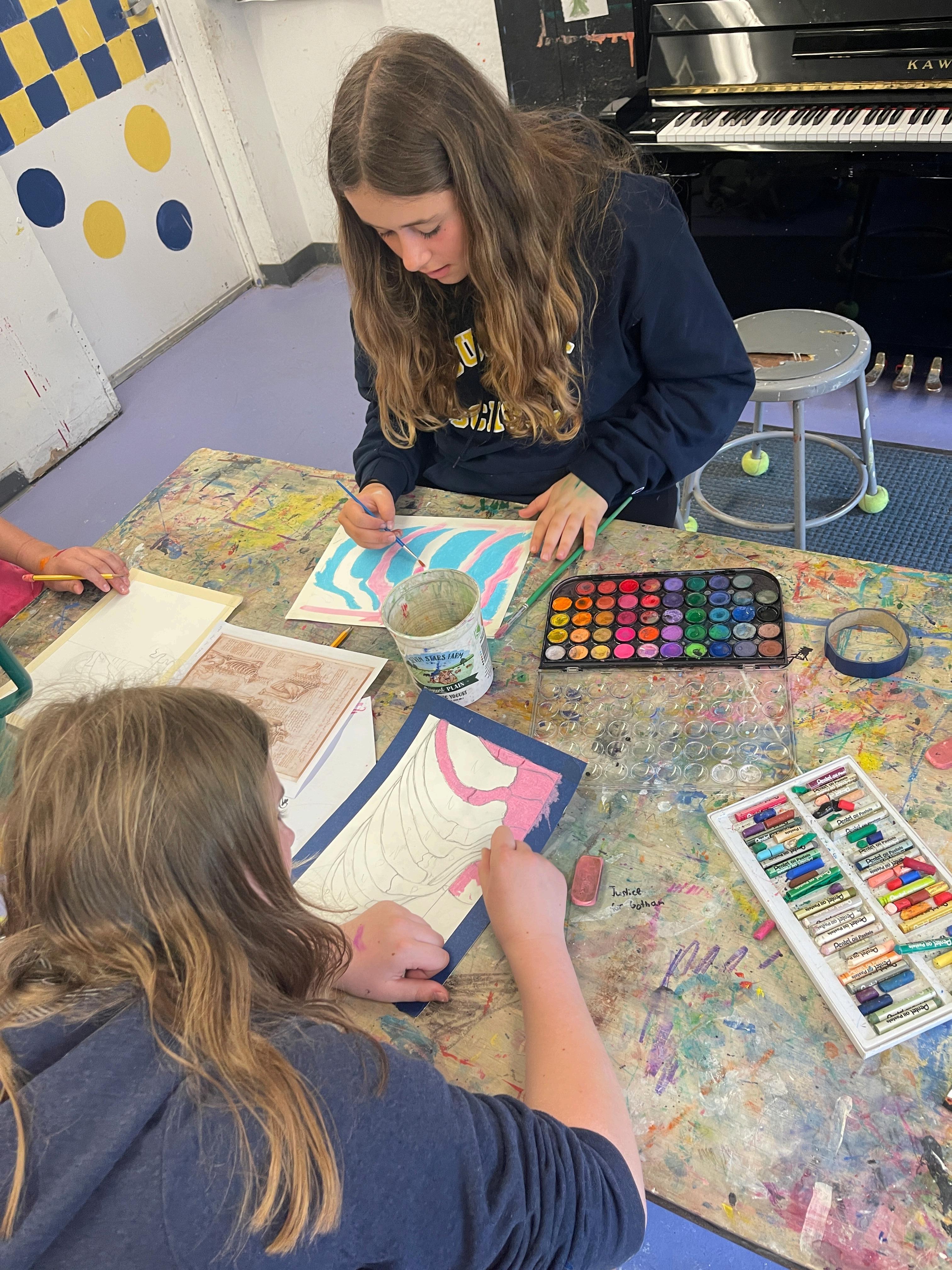
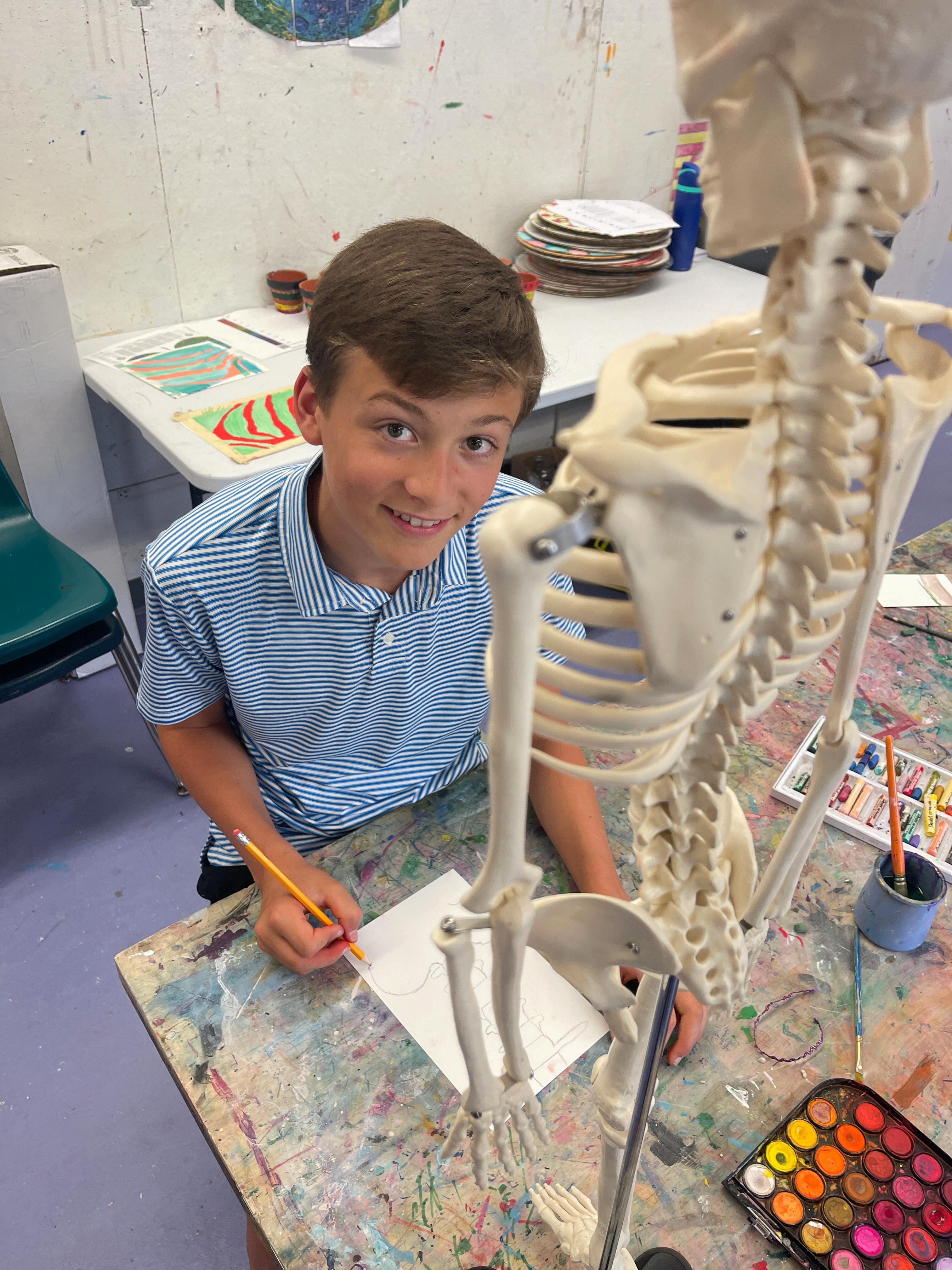
As 7th Graders embarked on their anatomy studies in science, they were simultaneously learning about Leonardo DaVinci’s rigorous observational drawings of human anatomy in art, the Golden Ratio in mathematics, and the Renaissance in history. This lesson was exciting because it was a natural extension of each discipline, and how the boundaries between them don't really exist. Collaboration bolstered understanding.
In science class, they were challenged to engineer and build a functional arm or leg using limited materials and to complete a large-scale drawing as a way to learn human anatomy. In art class, they followed up with a closer look at Da Vinci’s drawings, working from one of his original anatomical studies. Students learned how to use positive and negative space (the bones and the spaces between) as a tool and created artwork with oil pastels and watercolors.
This lesson was both successful and memorable thanks to how seamlessly the pieces fit together and how the kids engaged with the materials.


Each year the 7th Graders research an innovation from a country where the global language they study is spoken. They present their research through technology, write a speech about the innovation in their global language, and work in the art studio to create an artistic representation of their topic.
The students have much freedom with this unit, resulting in some incredibly brilliant presentations. Last year, one student created a video, suitable for YouTube, that explained the innovation of gunpowder. Two other groups utilized animation to demonstrate the origin of ethics and the ancient vending machine.
As this project continues to evolve, Mr. Wainio notes how the cooperating teachers are handing the reins more and more to their students. The 6th Graders take the lead and stretch themselves with their topic choices and their presentations.
A collaboration between our history and English departments, The Witness Stones Project allows students to delve into hard history by studying and honoring the life of a formerly enslaved person in Connecticut. This year, students studied Tome, who was enslaved at the Deacon John Grave House in Madison, and their work was recognized by Connecticut Public Radio, leading to air time on National Public Radio’s “Morning Edition” and “All Things Considered.”
Witness Stones allows students to see and tackle real problems from the past that they can use to impact the present, which hopefully motivates them to do similarly meaningful work in the future.
Country School students have installed five stones over five years with the Witness Stones Project, and each year is meaningful and memorable. Students are engaged and empowered by seeing real world results that impact the historical record and teach the greater community this hard history.

CPTV put together a documentary that spotlights Country School students. Scan here or click the link below to view.
https://video.cptv.org/video/ unforgotten-connecticuts-hidden-history-of-slaveryone-hour-special-vs4sgj/

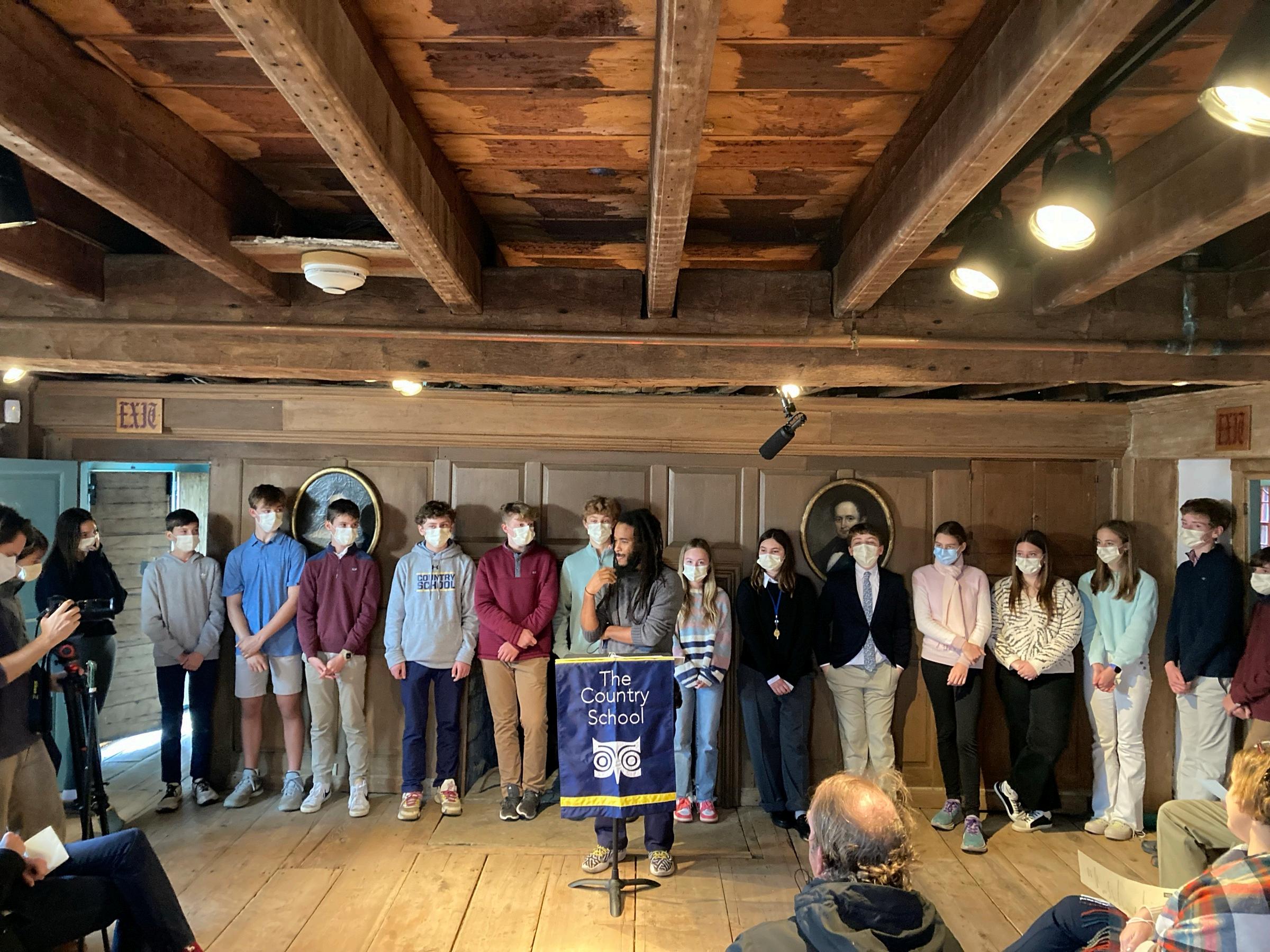
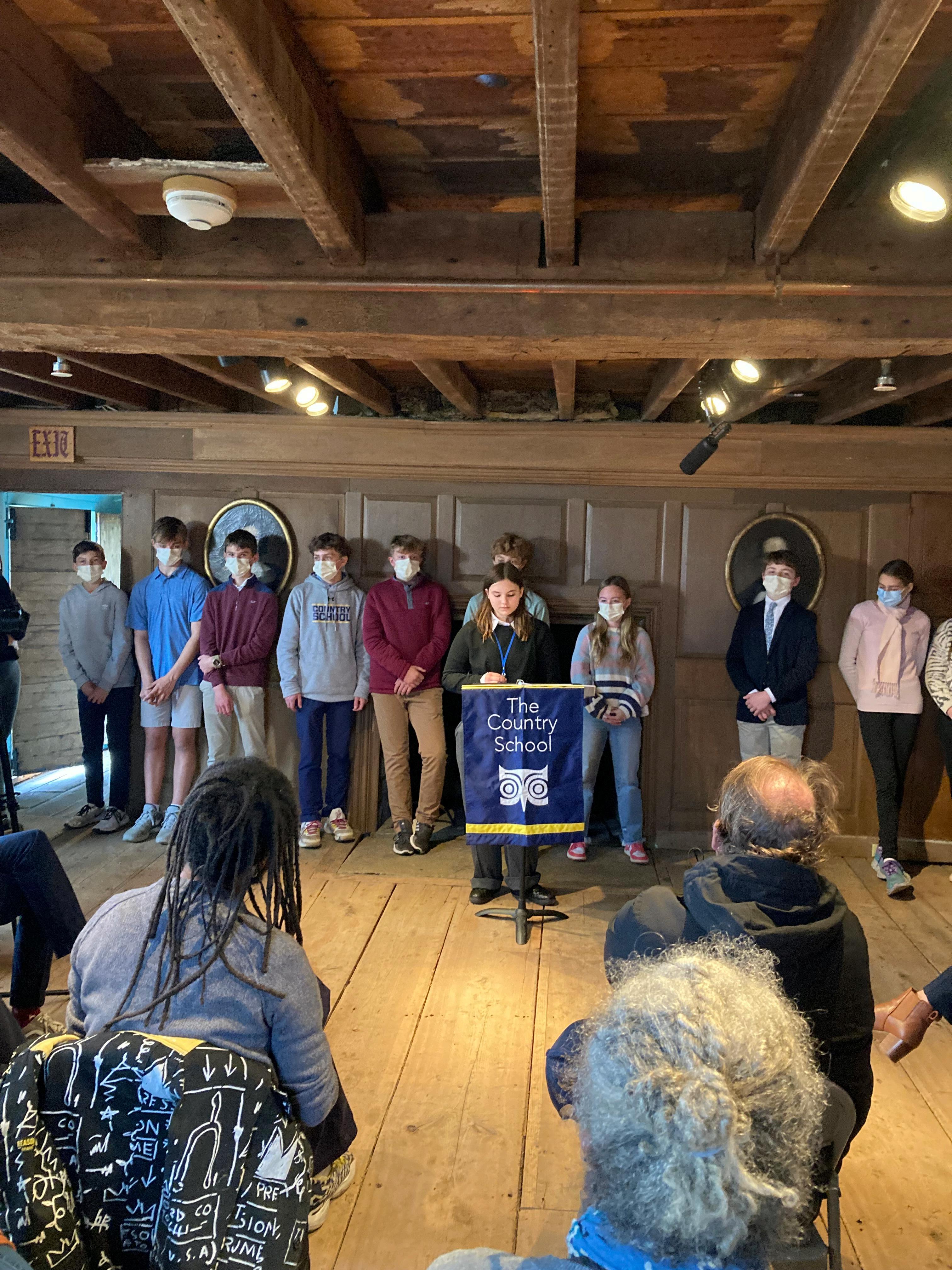
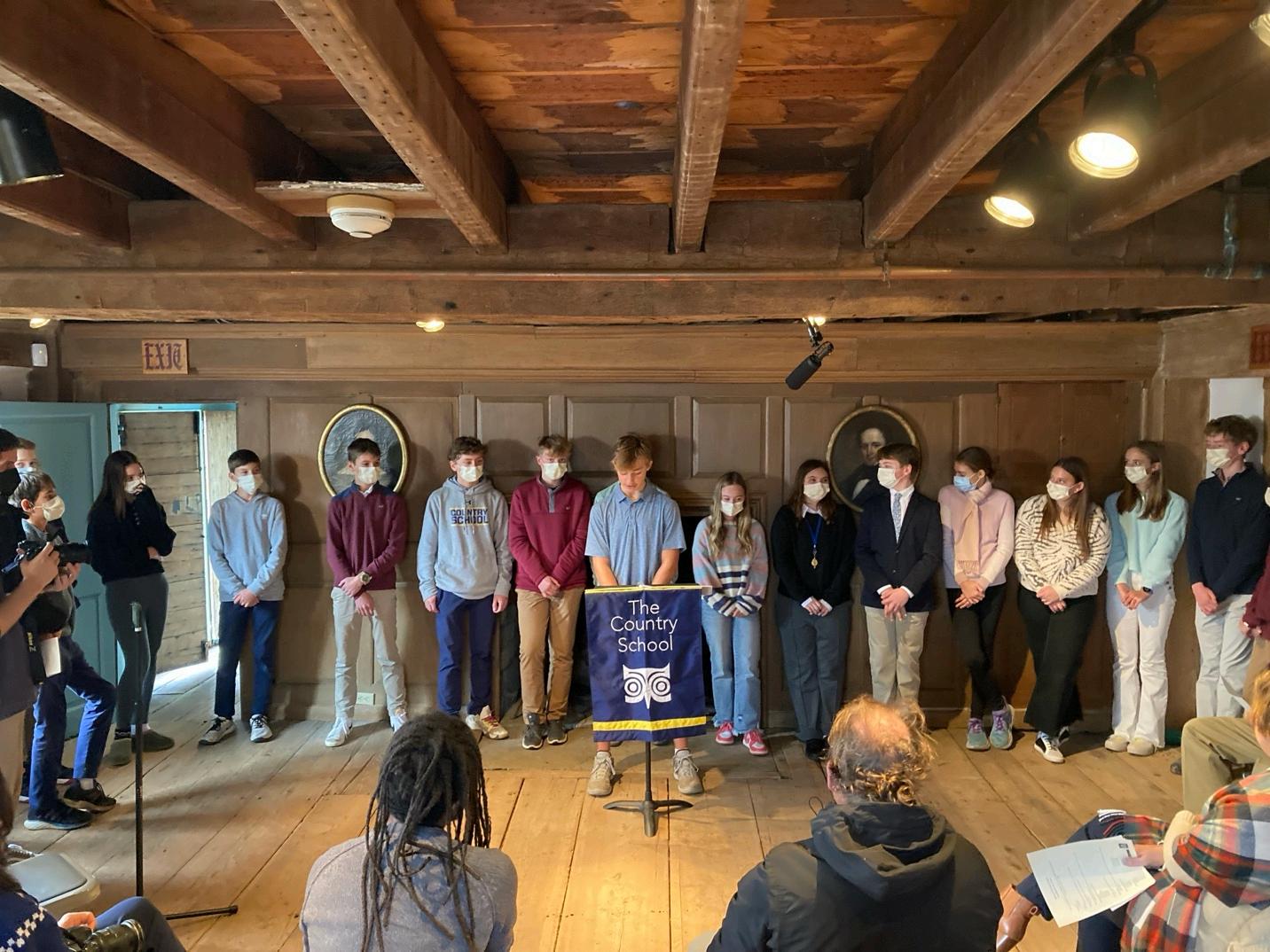

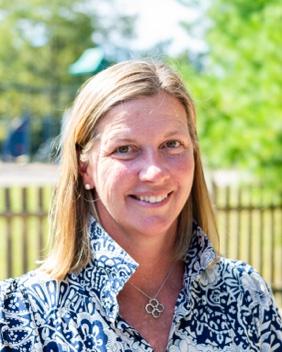
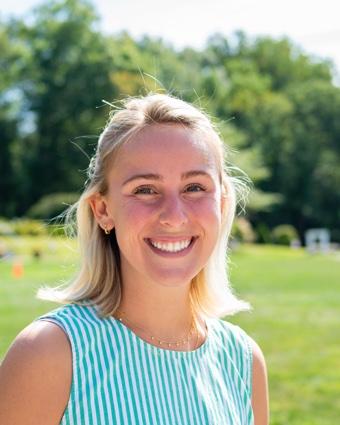
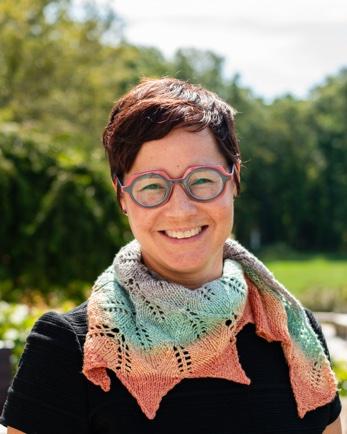
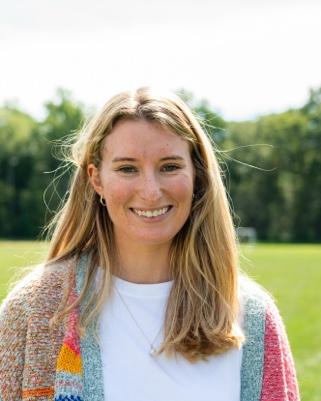


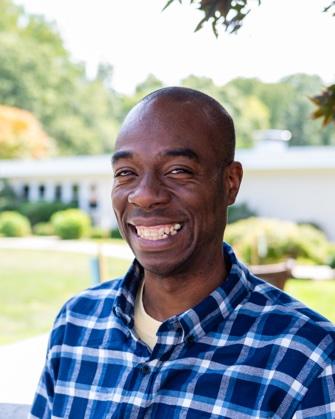
Each spring we bid farewell to departing faculty and then in the fall warmly welcome those new to our community. We are pleased with our newest recruits and proudly introduce you to them.
Joining our youngest learners is PreSchool Assistant Kate Beichner P ’24. Veteran educator Kate Beichner has experience as a Reading/Writing Paraeducator and Middle School English Teacher who supported teachers by working with students one-on-one and in small groups; assisted students with writing organization, content, and time-management; and tutored students in reading comprehension and literary analysis. A collaborative team player, she is noted for her patience, warmth, and positivity. One of Kate’s references noted, “She is kind and understanding not only with her students but her colleagues as well. Kate has been a problem-solver with a positive attitude.” She may have graduated as a parent last spring, but she is newly enrolled now in our PreSchool, for which we are grateful.
Coincidentally, we hired two teachers who were colleagues in the Associate Teacher Program program at Brunswick School in Greenwich. Here they will continue their commitment to educating our young learners. Neighborhood local Devon Piekarz will teach our new second section of 1st Grade and Emily Beinkampen will teach the second section of 4th Grade.
Devon Piekarz comes to us most recently from Rippowam Cisqua School, in Bedford, New York, where she has been teaching PreKindergarten. Prior experience includes teaching 1st Grade, Kindergarten, and PreSchool. She holds a Master of Arts in Elementary Education from the American College of Education and a Bachelor of Arts with a minor in education from Fairfield University. Ms. Piekarz's classrooms are known for creative and engaging lesson plans, a strong commitment to authentic assessment measures for her students, and excellent communication with parents. Ms. Piekarz's special interest in afterschool activities and programs, along with her positive attitude, enthusiasm, compassion, and collaboration skills, make her an ideal addition to The Country School.
Emily Beinkampen, a Cum Laude graduate of Middlebury College, recently completed her masters in elementary teaching this June at Fordham University. While pursuing her masters, Emily taught 2nd and 3rd Grade, demonstrating her energy and enthusiasm to lead our curious 4th Graders. With a background in Orton Gillingham–a multisensory phonics technique for remedial reading instruction– and having been trained by the Yale Center for Emotional Intelligence, Emily will be a powerful addition to our community, in the classroom and on the tennis court as coach.
Matt Esposito joined us this year as our STEAM teacher for Preschool and PreKindergarten, as well as an Associate STEAM Teacher for Kindergarten through Fifth. Additionally, Mr. Esposito will continue to play a vital role in planning, coordinating, and participating in the dynamic activities at Owl’s Nest. Over the past two years, he has distinguished himself as the Director of our Summer Program and the Coordinator of the Owl’s Nest Program. Mr. Esposito brings a unique combination of warmth, a student-centered approach, and strong organizational skills to our school community. A graduate of UConn, with a major in psychological services and anthropology, Mr. Esposito has a natural ability to engage young learners in thoughtful conversations and encourages the interests they bring to the classroom.
Amy Sun comes onboard as our new Associate Director of Admission and more. Amy will also teach Latin with Jason Wainio and serve as a student advisor, as a member of the DEIB Alliance, and as Lead Advisor to the 8th Grade Elmore Student Leaders. A graduate of Emory University and the University of Georgia, Ms. Sun earned undergraduate degrees in political science and Latin before taking her Master of Arts in Latin. Ms. Sun is well acquainted with the independent school world. She comes to us from Choate, where she served as Associate Director of Admissions and Enrollment Manager for Connecticut Boarding and Day students, was a member of the diversity and multicultural recruitment team, and wrote and delivered the Voices of Choate, an admission-related podcast. Before serving Choate, we knew her as Admissions Associate and a Latin teacher at Miss Porter's. There she was also a diversity practitioner, advisor, and program coordinator. Prior to that, Amy taught–in addition to assuming myriad other responsibilities–at Kingswood Oxford. All of this secondary school experience has allowed Ms. Sun to know Country School before even stepping foot on our campus.
Ben Taylor, esteemed physics teacher and administrator at Hopkins School, is our new Director of Information Systems, using his skills in technology integration and database management to oversee Registrar policies and procedures for regularly occurring tasks and annual events, and optimizing our coordination of academic programs, admissions, development, and alumni relations. Mr. Taylor is lauded by a good number of our families whose children, after graduating from The Country School, attended Hopkins where he taught or advised them. One Country School parent shared, “Ben is a very talented teacher and administrator. More than that, he is a truly genuine person who brings wisdom, balance, empathy, kindness, and authenticity to his relationships with students, parents and colleagues.” In addition to teaching physics from 8th Grade physical science to quantum mechanics, he has served
as the Director of Information Systems at Hopkins as well as a coach. Mr. Taylor also worked with teachers from 27 other schools across the country as Dean of Instruction of the Malone Schools Online Network. He earned his Bachelor of Science and Master of Science, both in physics, from the University of Connecticut. Ben's references underscored his popularity among his faculty colleagues, describing him as extremely responsive to their needs and highly regarded as both an advisor and a teacher.
After a nationwide search that generated over 70 resumes, the Search Committee conducted numerous interviews, made reference checks, and with great enthusiasm selected Christian Vick as our new Director of Development. During this time in the evolution of The Country School, and now especially as we are in the beginning of The Talent Within Capital Campaign, we are fortunate to have found a leader of Christian’s caliber to join our team. Most recently, Mr. Vick served as the Community Entrepreneurship Manager for Gather New Haven, where he organized special events, managed vendor relationships, and monitored staff performance. As the founder and principal driver of the James Vick Foundation, Christian grew enrollment into one of the largest free sports programs in the country, serving over 50 towns and cities across Connecticut. Equally important for our school, Christian is a “kids person” at heart, devoting much of his professional life to creating access to athletic opportunities for children of all backgrounds. As Christian steps into this pivotal role at The Country School, please join me in extending a warm welcome. I am confident that with your support, Christian will continue to build upon the strong foundation of our development efforts and help us achieve even greater success.

The Country School has long been a pioneer in STEAM education, integrating Science, Technology, Engineering, the Arts, and Mathematics across the curriculum. Our dedicated teachers craft lessons that not only build academic skills, but also cultivate creativity, collaboration, and a love of learning. Through our STEAM program, students from PreSchool to 8th Grade engage in handson, interdisciplinary projects that connect their classroom learning to the real world. By blending multiple STEAM disciplines, our lessons encourage students to think critically, problem-solve, and express their ideas in innovative ways. We have regular STEAM celebrations of learning, teachers invite outside experts to speak to their students, and we host community-wide events. A private school with a public purpose, we share our learning with families beyond our campus.
As the first STEAM elementary school in the nation, teachers dedicate time to the STEAM curriculum to ensure deep dives into rich content and real-world applications. The units begin with our teachers modeling collaboration; such a multidisciplinary approach creates authentic engagement for all students and fosters inclusivity. Overall, STEAM education cultivates a well-rounded skill set in young children, preparing them for success in school, future careers, and as active members of their communities.
By integrating the arts and sciences, STEAM education encourages children to think creatively and innovatively, to explore different solutions to problems and express their ideas through various media. Since STEAM activities often involve hands-on experimentation and problem-solving, children develop critical thinking skills. They analyze situations, make decisions, and find solutions to challenges.
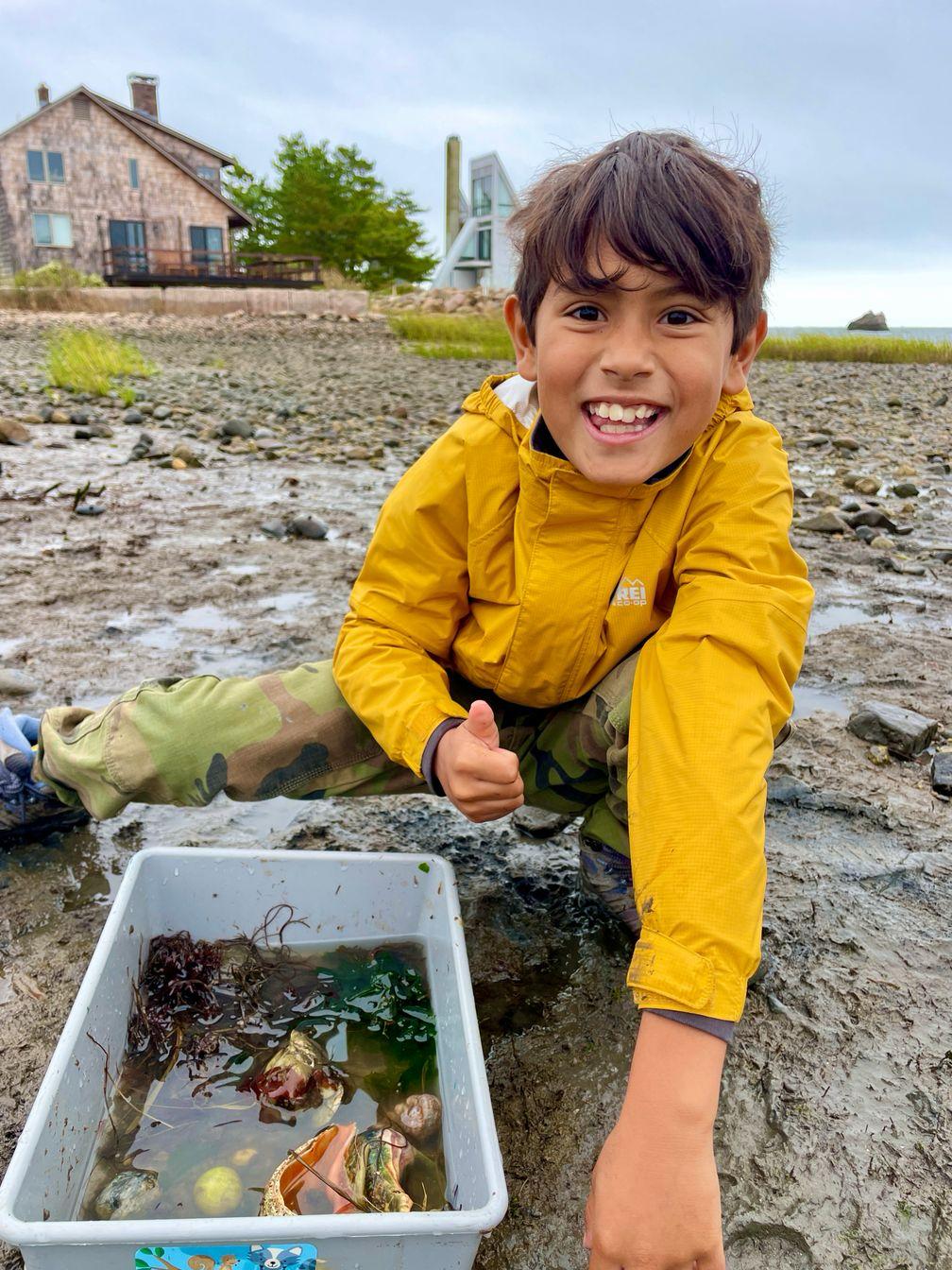
Many STEAM activities are collaborative, requiring children to work together, fostering communication skills and teaching them to share ideas and learn from each other's perspectives. Exposing our youngest learners to STEAM can spark interest and confidence in fields such as science, technology, engineering, the arts, and mathematics. This early exposure lays a foundation for future career paths in these fields. STEAM lessons promote persistence and resilience thanks to activities that often involve trial and error. As a result, children learn that failure is a part of the learning process and develop a growth mindset as they iterate and improve their ideas.
The Country School STEAM program uses the Next Generation Science Standards (NGSS) as a Framework. Life science earth/space science, and physical science are the three main areas covered, in addition to the Engineering Design Process. There is a focus on depth over breadth. The NGSS emphasizes the teaching of cross cutting concepts throughout all content areas. They include patterns, similarity, and diversity; cause and effect; scale, proportion and quantity; systems and system models; energy and matter; structure and function; stability and change. The goal is to teach students to think, write, read, question and collaborate.
Often ideas explored come from the children themselves based on their questions, things they wonder about, their curiosities, and interests. NGSS is a framework, but many times learning happens when a student poses a question, wants to know more about something we are studying, or about phenomena they observe. “I think that’s what’s really unique about The Country School STEAM program. We have the luxury of expanding students’ circle of inquiry and in turn knowledge because learning here is not from a purchased cookie cutter curriculum. That flexibility allows for a much richer learning experience,” said Claudia Esposito, Lower School STEAM Teacher.
For example, during 2nd Grade seed dispersal investigations, a student wanted to know exactly where seeds come from and how plants form seeds (not part of the original plan). This led to a flower dissection lab. Using plants from our campus garden we explored the inner workings of male and female flower anatomy, observing how plants make seeds up close through this hands-on investigation. Students also engineered their own “seed movers” using natural materials to demonstrate their understanding of seed dispersal methods used by real plants. The new Class of 2024 Greenhouse is a transformational addition to our already amazing learning experiences.
The benefits of a STEAM education extend beyond the classroom. Students have opportunities to improve their soft skills such as communication, self advocacy, leadership, and confidence. Celebrations of Learning allow students to share their discoveries with others; families and friends are invited into the classrooms to hear what the students have to say. Regular Celebrations of Learning fill our children with confidence and provide them with opportunities to practice their public speaking. Collaboration, integration, and problemsolving–the hallmarks of a STEAM education–prepare today’s students for tomorrow’s complex problems, help them see the big picture, and teach them to hone their critical thinking skills to make evidence-based decisions.
A STEAM education also enhances digital literacy. In an increasingly digital world, STEAM education helps children become familiar with technology and digital tools. They learn basic coding skills, digital design principles, and how to navigate digital environments responsibly. Ultimately, a STEAM education prepares students for growing professional fields–ones that might not even exist today, and Country School teachers begin this preparation as early as PreSchool.
Our 3rd and 4th Grade collaborative unit on Long Island Sound is a revealing example of how Country School faculty work together to create a well-rounded learning experience for our students. In addition to science topics which include investigations about the topography, water chemistry, and the creatures that live in the Sound, students create beautiful landscape works of art, use technology to create Google slide presentations showcasing their knowledge of Long Island Sound flora and fauna, sing songs about waves, investigate sounds of the saltmarsh, and engineer imaginary creatures based on features of those we find on our field trip to the Sound. The real stretch for these students is a bit of physics: they work collaboratively to construct a “wave machine” that demonstrates the anatomy of a wave and how waves function.
Foundational to every STEAM lesson at Country School are key skills that prepare students for future success: observing, inferring, predicting, classifying, and communicating. Through hands-on exploration, students utilize their five senses to notice patterns, differences, and changes. They venture beyond simple observation to reach logical conclusions by combining their findings with prior knowledge. This process of questioning and discovery fuels students' natural curiosity, inspiring them to further investigate the world around them.
Classifying and organizing information helps students make sense of complex concepts. Whether creating Venn diagrams, cycle diagrams, or data tables, Country School students develop strong organizational skills that support their understanding. Students engage in rich discussions, share ideas, and communicate their learning through writing, drawing, speaking, and modeling. This practice cultivates essential skills like critical thinking, problem-solving, and teamwork. By nurturing these fundamental skills, The Country School STEAM program empowers students to become inquisitive, adaptable, and effective communicators.
In PreSchool and PreK, our youngest learners embark on captivating STEAM journeys, exploring the life cycle of ladybugs in the school's Children's Garden or designing engineering challenges inspired by children's literature such as “Goldilocks and Three Bears” and “Jack and the Beanstalk.” As part of their study of Earth and Space Sciences, they explore the natural features of our campus environment, observe weather phenomenon and patterns, and compare seasonal changes. The tools and technology they use include everything from magnifying glasses and binoculars to robotics devices such as Bee-Bot and learning basic coding language. These immersive, play-based experiences spark curiosity and develop essential skills like observation, inference, and communication.
Early development of essential/soft skills: teamwork, problem-solving, communication, adaptability, critical thinking, interpersonal skills, time management, leadership, reliability, conflict management
• Develop confidence
• Develop resilience
• Cooperation
• Love of learning
• Encourages curiosity
As students progress, the STEAM curriculum becomes more robust, with Kindergarteners creating collages inspired by trailblazing artist Alma Thomas and 1st Graders collaborating to write and illustrate their own bilingual storybooks. Throughout the 3rd and 4th Graders’ study of the five ecosystems of Long Island Sound, they learn about the topography of Connecticut and Long Island Sound, do population sampling and horseshoe crab tagging in LI
Sound, and participate in International Coastal Cleanup. They study the plants and animals of LI Sound and participate in a plastic pollution engineering challenge. At this point in their STEAM education they can be found on the shoreline–far from their classroom–using microscopes and thermometers and using water testing methods and tools as they learn about their local ecosystem. Through these multidisciplinary projects, students refine their critical thinking, organization, and digital literacy.
In the Middle Grades, Country School’s STEAM program delves deeper, tackling subjects like electricity, natural disasters and architectural adaptation. Sixth Graders investigate plate tectonics and the science of space exploration, while 7th and 8th Graders dive into a rigorous biotechnology curriculum, physics, anatomy, and physiology. Their capstone assignment is the Elmore Independent Research Project. Students utilize specialized tools and technologies, developing expertise in areas like micropipetting and electrophoresis. The Country School has a proven track record of implementing age-appropriate real-world science learning to the Middle School classroom that includes exposure to modern molecular platforms that are currently being used to build products and uncover biological systems and processes in health and disease, laying a foundation for beyond high school and career growth. Country School focuses on promoting science communication, discussion, self-advocacy, and risk taking in a hands-on lab based environment.
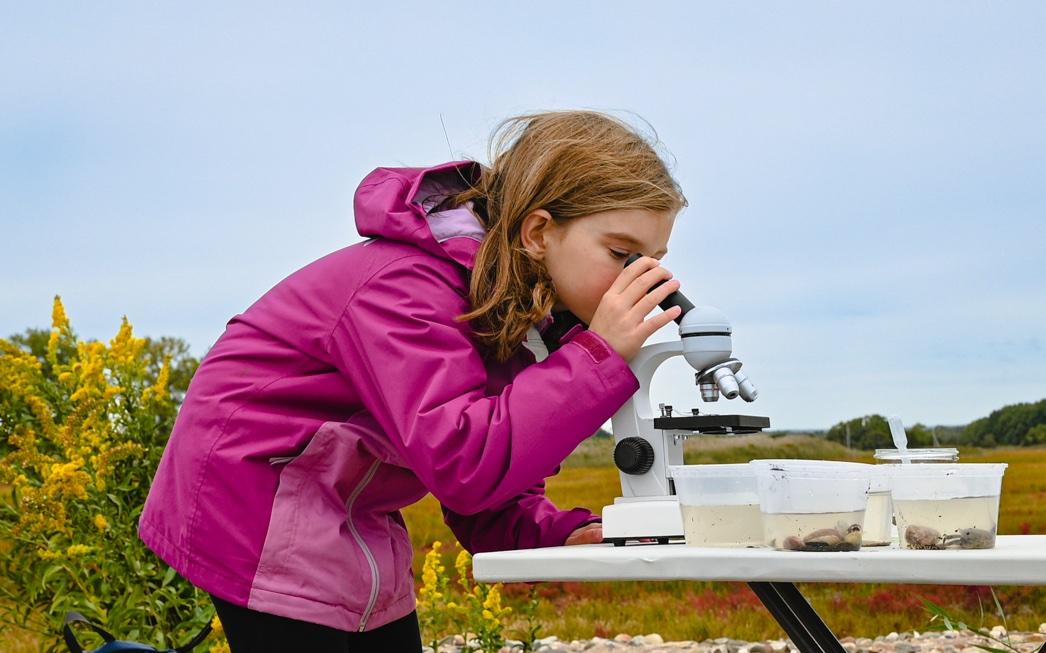
Woven throughout the STEAM curriculum is a focus on global citizenship. Students explore worldwide issues like climate change, plastic pollution, and endangered species, learning to think critically about the real-world applications of science. They study climate change and natural disasters, sustainable building methods and materials, and human impacts on Earth and in Space. This global perspective empowers students to become thoughtful problem-solvers and engaged members of their communities.
In the recent past, we have hosted an Astronomy Night and a STEAM Night, and have invited members of the local community to join us on campus for these hands-on children-centered activities. Such events underscore how STEAM connects learning to real world applications, showing children how their learning can be used to solve practical problems in their communities and beyond. This makes learning more meaningful and relevant to their lives. Country School has partnered with the following organizations:
• Madison Garden Club
• Thames Valley Rockhounds: 3rd Grade geology/petrology studies
• Astronomical Society of Greater New Haven (Grade 3 Earth and Space studies)
• A Place Called Hope: Grade 1 Owl studies
• Meteorologists from News Channel 8 and WNBC Connecticut (Kindergarten Weather studies)
• Parent presentations: doctors, researchers
• Civil Air Patrol: (Grade 2 Aerospace studies)
• Wesleyan University
• RJ Julia Booksellers
Partnerships with community businesses, clubs, and organizations make our program unique and enrich students’ learning. Earlier this month, Madison Garden Club members Esther Magee and Julie Elting received an award for their work with our Country School students at a statewide Federated Garden Clubs event. Some of the work they've done with Country School will be on display at Scranton Library at the "GCM 100th Anniversary Historical Exhibit" through November 20. Such relationships encourage our students to look beyond themselves.

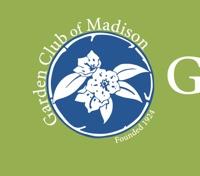
Hi John,
Hope you had an exciting but restful summer. e beginning of the new school year has always been a positive memory for us. Julie and I wanted to extend a huge thank you for allowing us to work with your Country School team these past few years. e students were engaged, creative and cooperative. During our time together children created foral arrangements for senior citizens, learned about sustainability with Country School gardens and the signifcance of pollinators in our lives.
e students were actively engaged in planting garlic, propagating cabbage, and harvesting the vegetables; always in tune with their own environment. e teaching teams collaborated with us in organizing and promoting the importance of community awareness and compassion for others.
As part of the Madison Garden Club Youth Educational Outreach Program, our goals are to work with local scouts, school groups, and junior garden clubs to help instill in children the importance of caring for the environment, respecting our natural world, and building a joy of gardening.
Claudia Esposito, STEAM teacher, has been a valuable asset to us. Always taking the initiative to understand our role in the community, aligning the curriculum with the school and our goals and demonstrating exceptional organizational skills, she has been a major part of our success.
Julie and I look forward to working with you this upcoming school year. We both have been inspired by your students and staff and recognize the joy of teaching and working with children.
Regards, Esther Magee Julie Elting
STEAM education, encompassing science, technology, engineering, the arts, and mathematics, plays a crucial role in shaping a holistic education for adolescents and young adults. It not only equips students for the future job market but also fosters community engagement. STEAM learning is occurring both in and out of classrooms, and involves diverse activities. It encourages curiosity-driven exploration, facilitates playful learning experiences, and connects problem-solving with practical solutions. A perfect example of how STEAM learning connects with the real world is Country School’s Green Initiative with students serving as environmental stewards: composting, recycling, utilizing our campus gardens and Class of 2024 Greenhouse, and potentially collaborating with Gather New Haven to feed the food insecure.
By nurturing students' natural curiosity and providing hands-on, crosscurricular learning experiences, the Country School STEAM program prepares our students for success in school, future careers, and as active contributors to an ever-changing world.
Karen Chiaia
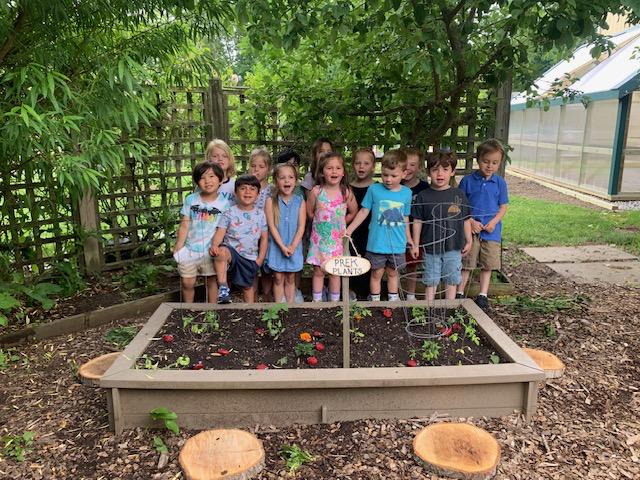
"There must be provision for the child to have contact with nature; to understand and appreciate the order, the harmony and the beauty in nature."
-Maria Montessori
For the past 17 summers, Early Childhood Teacher Ms. Chiaia has participated in Seedlings Educators Collaborative, a program that honors, supports, and connects educators from public, parochial, and independent schools by offering ongoing opportunities to share and learn from one another and other experts, to build connections with community resources, and to provide environments to reaffirm their common passion for education. Teachers come together to learn and share transferable strategies and STEAM concepts through a variety of experiences, including visits to local parks and museums
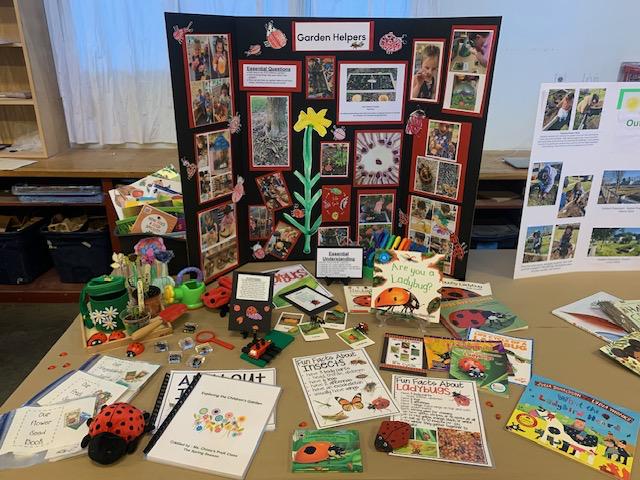
and hands-on activities with experts in areas such as child development, art, technology, science, and history. Last summer’s program focused on placebased learning, an instructional approach that centers on developing students’ sense of place and learning by discovering and exploring their environment. It allows students to make connections between what they're learning and the real world and helps them make personal connections to their community.
Seedling attendees were tasked with creating a year-long place-based unit for their students. Ms. Chiaia seized the challenge and crafted a year-long educational experience for her students, an adventure filled with discovery and exploration in The Country School’s Children’s Garden. Their unit began in the fall, with students observing nature's transition, marveling at the changing leaves and preparing the garden beds for winter. Even in winter, there was much to discover. The students walked through the snowy garden and compared the sleeping plants to their lively summer selves. Ms. Chiaia was teaching her students to appreciate the beauty of every season. As spring arrived, they observed the miracle of new life: shoots peeking through the soil, bugs scurrying, and a colorful landscape emerging. Each visit to the Children’s Garden was filled with learning opportunities, from understanding seasonal changes to observing the wonders of nature.
Over the months, exploring the Children’s Garden with her PreK students became a journey of discovery, with learning taking place outside their usual classroom walls. As they navigated the Children’s Garden, students encountered a vibrant ecosystem teeming with life and natural wonders. They observed bees pollinating flowers, ladybugs feasting on aphids, butterflies flitting among plants, and ants hurrying along their pathways. They witnessed the life cycle of plants firsthand, from seeds germinating into seedlings to flowers blooming and attracting pollinators. These experiences not only deepened their understanding of the environment but also instilled a profound sense of curiosity and appreciation for the natural world and for this special spot on their campus. Ms. Chiaia’s students were filled with questions.
Back in the classroom, the PreKers immersed themselves in discussions inspired by their observations. Working together, they created charts and lists to compare the garden's seasonal transformations. These eager students wanted to contribute to the garden's growth, so they studied the magic of life contained within a tiny seed. Their curiosity and excitement fueled their learning. They selected bean seeds to nurture and tend and created the perfect environment for their seeds to flourish. Soon they began to understand
the balance required to support life's earliest stages. Learning was sneaking up on these young learners through their inquisitiveness and enthusiasm. Their learning was authentic and personal.
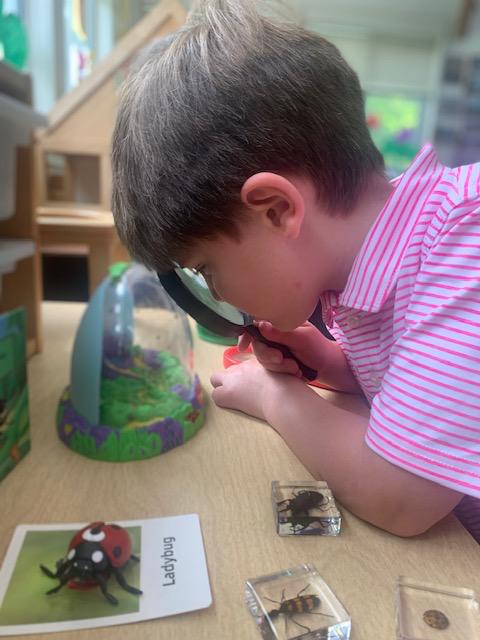
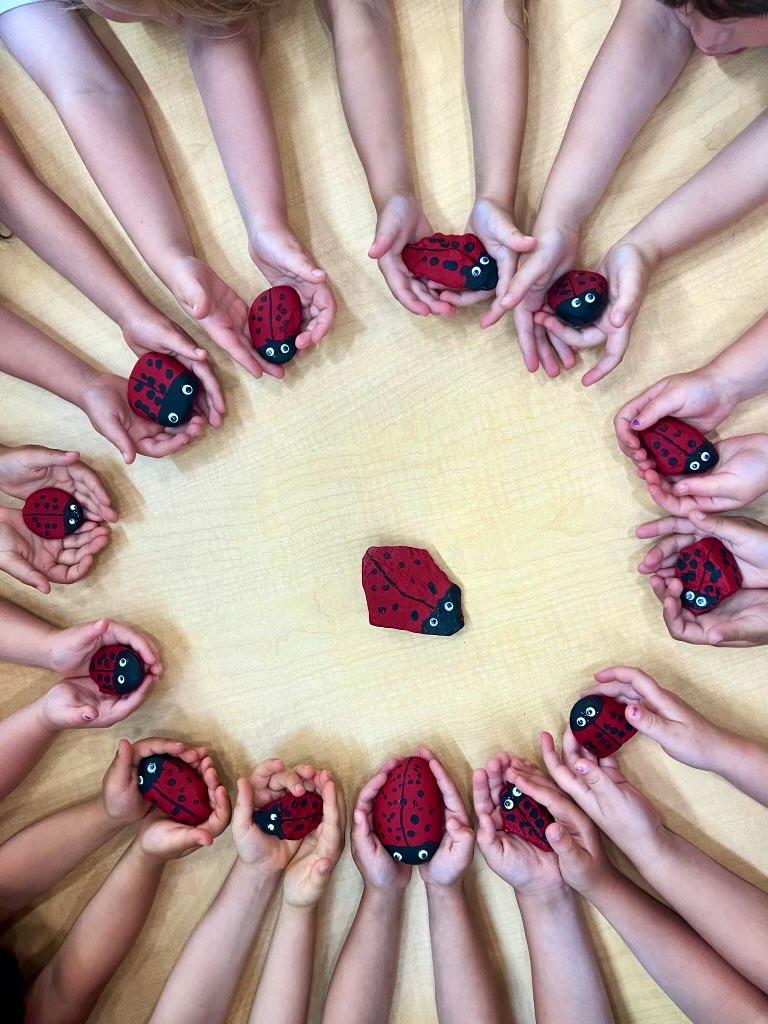
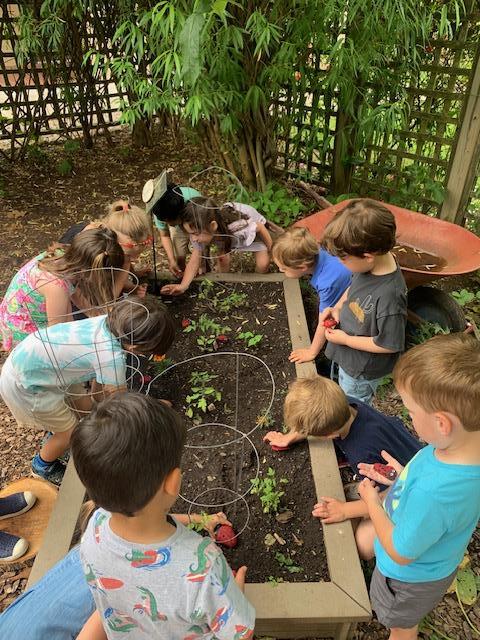
While summer signals a break from formal learning at The Country School, our teachers have continued to stretch themselves through a diverse array of professional development opportunities on and off campus. One of these opportunities was the creation of an Artificial Intelligence (AI) working group to help guide our campus community through the exciting possibilities and potential stumbles of generative AI.
John Fixx, Kristin Liu, Karina Mendez-Keil, and Ben Taylor, along with several other Country School faculty and administrators, enjoyed an initial Connecticut Association of Independent School kick-off session hosted by Hopkins School early in the summer. Faculty and administrators across disciplines and grade levels then met multiple times to gather ideas, talked philosophically about AI, and suggested an approach to prepare young people as leaders and learners.
Country School’s existing Academic Integrity and Acceptable Use policies govern that the use of any tool, including AI, to produce work purported as one's own is against our community values and how we are preparing our students for secondary school and higher education. As our academic integrity policy states, “Academic honesty is essential to a healthy atmosphere for learning. It encourages trust and teaches us to seek the true understanding of the presented material. This is essential for building academic competency and growing creativity . . . The process of figuring out a complex challenge on one’s own not only increases knowledge, but also instills a sense of pride and accomplishment and promotes the level of independence needed to achieve personal goals.”
The Country School teachers value the powerful opportunities AI can bring to learning and will model safe and appropriate use of this new technology. For example, under the guidance of a teacher, older students might use an AI tool to generate ideas for an upcoming history project or build a study guide to help prepare for a test. They could practice writing and revising thesis statements for an English essay or testing the wording of hypotheses for a science lab. They might soon converse with a chatbot to practice their global language skills. These are just a few of the positive learning opportunities we see coming out of this rapidly expanding technology.
As a PreSchool - 8th Grade school, Country School teachers understand that students often need extra guidance and protection with technology tools, and that is particularly true of generative AI. Many people don’t know that, at this time, children under the age of 13 are prohibited from creating accounts on most of the generative AI platforms. Country School promises to keep current on age restrictions and regulations as determined by COPPA (The Children’s Online Privacy Protection Act), as well as best practices surrounding the use of AI by children in schools and will communicate with families as safe AI tools for student use are developed and desirable within our technology ecosystem.
The AI working group presented their ongoing work to the full faculty and provided time to experiment with various tools and discuss their place on our campus. All Country School students will continue to receive an ageappropriate grounding in critical thinking and media literacy. The working group will continue to meet throughout the year, recognizing that generative AI is changing every day. They hope to host a session or two for interested parents and grandparents.
We live in fascinating, fast-moving times. It is our job as educators with parent partners to make sure Country School students are prepared to take on not just the world that awaits them but the world that currently surrounds them.
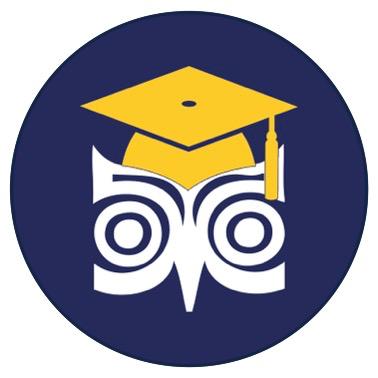
Fellow Country School Alumni,
I would like to introduce myself as your new Director of Alumni Relations. If you don’t know me, I am a Country School Lifer, calling the school home from 1999-2009. Four years ago, I returned to TCS as a Middle School English and history teacher. I love this school, and I’m excited to bring the alumni community together to share in that love and appreciation of our Country School education.
As I step into this role, I have so much gratitude for our outgoing Alumni Director, Liz Lightfoot ‘77. You all know Liz, and you all have been touched by her commitment to TCS, not just as our Alumni Director, but also through the many roles she has played to help the school grow. We are happy to say that Liz is not going far as she focuses on her amazing work as Director of Operations at the Witness Stones Project. She will continue to work with our 8th Graders on that yearly project, and will also continue to guide us when celebrating The Country School’s history. But as alumni, we all owe her tremendous thanks for keeping us connected.
With that in mind, my goal is to continue the mission that Liz and others have established, namely to help you maintain your Country School roots. We have begun some exciting projects and have more to come, including:
• Our Summer Reunion this past July and upcoming Alumni Day on November 26
• Celebration of the Distinguished Alumni Award on November 26
• Opportunities for you to be part of the Alumni Association as a cochair, class officer, or city ambassador–if you are interested, please contact me: alumni@thecountryschool.org
• Digitizing our archives, including yearbooks, literary magazines, founding documents, and over 1,500 photos
• A new alumni logo designed by Suzanne Sliker P ’19 and ’22
• Quarterly newsletters like this with news from school, announcements, and Alumni Spotlights (see below)
Our Alumni Association is strong because of your participation and shared love of Country School. For many of us, our Country School years were some of the best of our lives.
I’m sure that Country School still holds a special place in your heart, that you credit your years here for your success today, that you remember all of your classmates and teachers, and that TCS memories still pop into your head every now and then. I’m excited to help you find ways to relive those formative and memorable years and reconnect with the people who made them so special.
I hope you take some time to explore all of the wonderful things currently happening on campus and that you join us in our mission to grow the relationship between Country School and its alumni.
With best wishes, Peter Burdge ‘09
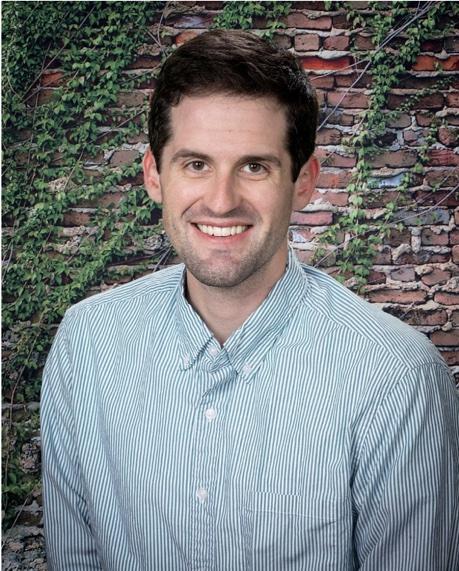


Sarah Bradford ‘07 credits her Country School teachers for encouraging her to think beyond our community, which she now does as an attorney helping recently-arrived migrants to New York find their footing in their new home.
I am an Associate Attorney in the New York office of the global immigration law firm Fragomen. I represent companies and individuals on a wide range of U.S. inbound immigration matters, including temporary work visas, employment-sponsored green cards, and marriage- and family-based green
While my company clients cover various industries, including electric vehicles, foreign policy and exchange, museums, tech, banking and finance, and personal care, the direct human impact I feel on a daily basis is rewarding and meaningful.
At Fragomen, where immigration has been the sole focus for over 70 years, I am part of a group where people seek our expertise and guidance during their bravest and extremely personal life milestones: transitioning their lives to a new country, sometimes on their own and other times for family unity or falling in love. In my pro bono practice, I assist immigrant survivors of domestic violence, Deferred Action for Childhood Arrivals (DACA) recipients, and recently arrived migrants through asylum seeker resource fairs and work authorization clinics across the five New York City boroughs.
The tightly knit community of The Country School and the small studentteacher ratio established a strong foundation to nurture and attend to the details when serving client needs.
The first teachers who come to mind are Mr. Wainio and Mr. Storms. Mr. Wainio was my Latin teacher and his teaching without a doubt served as a launchpad for my international curiosities and to continue studying language (Latin, Ancient Greek, and French) through high school and college. This
instilled a global mindset which landed me in the field of immigration law out of undergrad and inspired me to pursue law school. Mr. Storms was my English teacher, and going to his classroom was always the highlight of my day. I attended Country School for a mere two years, but with Mr. Storms, I always felt included academically and in on the many jokes he was cracking. I can say with certainty that his bibliophilic nature and love for learning were transferred to me, and now I am in a profession meant for people with a hunger for challenging their beliefs and knowledge base every day.
Funnily enough, the Class of 2007 dedicated our yearbook to both Mr. Storms and Mr. Wainio. The words in the dedication still ring true and make me think fondly of them.
Mr. Wainio, though some of us have only known you for a year, we all know you as a humorous, caring, Star Wars-loving, wise Latin teacher (and much more). You’ve believed in us through the years, even when we believed all hope was lost – from trying to make logic of Roman numerals to finding our secondary schools. Thank you for all of the values you’ve instilled in us and for all of the fun times we’ve had together, and ‘may the force be with you!’
Stormy, you have always been there for us. At times we would like to decapitate ourselves because of your corny jokes, but when we walk into your class, we feel you are very avuncular toward us. You’re a wise pedagogue who is always ready to help us out. You are a true bibliophile whose amicable nature pacifies us all.

Aaron Silidker ‘99 credits the Country School with allowing him to “tinker” and explore his passion for mechanics, which he now does as the founder of RoamRig van upgrades.
I currently run a small business in North Branford called RoamRig. We make electrical parts/accessories for a very narrow niche of the camper van market, specifically for Sprinters and one model of Sprinter based van called the Winnebago Revel. The Country School always encouraged independence and finding your "thing" as a student. The spirit of independence and exploration at Country is certainly something I've carried with me through my education and career. The Country School 100000% encouraged me to explore and tinker. Tinkering has and will always be my "thing." It led me to my business.
There are LOTS of Country School teachers and experiences that center around independent thinking and exploration...for me, that was tinkering. I will give you a specific one about Chris Wallack. At some point, Country School had a device for painting lines on the fields. As a kid who always, ALWAYS loved tinkering with machines, I thought this one was super cool. Put some paint in, start an engine, pull a handle, and paint comes shooting out. One day during gym class, Mr. Wallack let me play with the line striping machine. Clearly this was only barely adjacent to gym class and physical activity, but he allowed it. He trusted me.
Another fun mechanical-related memory was The Country School auction in 1996 or so. As an 11 year old, I donated an oil change for someone's car. Former Head of School Ed Blatchford bought it, and I changed the oil in his Honda Accord. What other school would have a headmaster who lets an 11year-old change their car's oil and filter? Mr. Blatchford’s wife, Claire, a hearing-impaired woman, let me, then a 5th Grader, call her on a TTY system because I was so interested in learning how it worked, which leads me to another fun story: my desk alarm.
The summer before 5th Grade, I took an electronics class at the Eli Whitney museum and built an electronic alarm with a very loud buzzer that would sound (and stay on until reset) when someone opened a door. When I arrived to school that fall, I learned that there were two 5th Grade homerooms, and we used to move from one room to another. The tops of our desks lifted up, allowing us to store all of our belongings. Kids from the other class used to go through my desk, which irritated me. Thankfully, my homeroom teacher, Mr. Krugman, indulged my passion for tinkering. He let me install the alarm I had made that summer on my desk so that no one could go in there.
The Country School was a place that recognized that I liked to tinker and explore, and my teachers definitely nurtured that wherever possible. As an adult I marvel at how wild it was–in a good way–that Country School let me be me and let me explore and build.

Colin Higginson ‘19 credits the Country School for instilling in him resilience, strong work habits, and a love of history, which he uses now at Trinity College Dublin and hopes to use in achieving his goal of opening his own medical practice.
I am currently enrolled in the Business, Economics, and Social Studies (B.E.S.S.) program at Trinity College Dublin with a concentration in Business and Economics. I plan on applying to medical school upon completion of my undergraduate business degree and am considering taking a gap year to complete my prerequisite STEM courses. With my degrees in business and medicine, I hope to eventually open my own medical practice which will allow me greater control over my schedule and work environment in the short term, as well as provide opportunities for affordable and personalized healthcare to my community in the future.
My academic experience at Trinity is far from what I expected it to be. Unlike many American institutions, Trinity places great emphasis on final exams and essays, with many accounting for as much as 70% of a student’s final course
grade. It goes without saying that preparation for these exams is stressful, as there is little room for error and even less room to make up for a poor exam grade. When I encountered roadblocks while studying for these exams, I often found myself reflecting on my academic experience at The Country School. My teachers never gave up on me and impressed upon me the importance of resilience and attention to detail. Because of their dedication to my success, I have adapted to the many challenges that accompany studying abroad and have grown to appreciate the time and effort my Country School teachers contributed to my academic and extracurricular success.
While I admittedly had no plans to study abroad during my time at The Country School, my history teachers definitely influenced my decision during my college application process. I have many fond memories of studying history, especially with Mrs. Kelly and Mr. Wainio. I have truly appreciated learning about Trinity College Dublin’s extensive history, and I am reminded of my time studying the ancient Romans and Greeks at TCS every time I enter Trinity’s idyllic front gate.
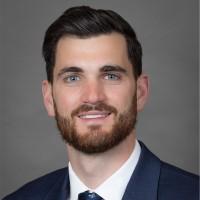
Will Steiner ‘09 credits the Country School for giving him his competitive spirit and love of sports, which led him to become the first soccer player inducted into the Fairfield Prep Athletics Hall of Fame. He continues to use lessons from The Country School in his current work at Northwell Health in New York.
I have so many fond memories from The Country School and amongst the top are the daily recesses and gym classes during which we played like it was the World Cup Final, the Super Bowl, the NBA Championship, or whatever equivalent depending on the sport we were playing. I started playing travel soccer very young; the expectations were already high, and the environment was demanding. I’m fortunate that I was able to play other sports like lacrosse and basketball for Country. Playing basketball and lacrosse and having regular gym class was so
important for me because it allowed me to compete with my closest friends while still having fun playing multiple sports. My parents always told me that the most important thing for me as an athlete was to make sure I was still having fun – this lesson carried through my athletic career and was certainly reinforced at The Country School.
Country School was such a tight-knit community, and I was so close with my friends that taking the field with them was pure fun and camaraderie. It certainly did not hurt that my closest friends also loved sports and all we wanted to do was be out on a field or a court playing together. I learned about teamwork and sportsmanship at TCS, as we had wonderful coaches and mentors to teach us not only the skills we needed to improve athletically, but how to hold ourselves and how to play hard and with respect for others. I carried these key lessons with me throughout my soccer career at Fairfield Prep and Villanova, both of which share similar values to those of The Country School. The importance of treating others with respect, playing together, and giving it my all were critical to my success athletically.
Finally, it is impossible for me to think about sports at Country School and not mention my gratitude for and fondness of Mr. Wallack who devoted so much of his time towards the betterment of his students both athletically and as people. Country School emphasized the importance of treating others with respect, compassion, and generosity, values that I continue to live with today. I am grateful to have been in an environment where they were fostered so early on.
I currently work in Business Development at Northwell Health, which is the largest health system in New York State and is the largest private employer in NYS. My team focuses on the strategic development of our ambulatory network. I love the work that I do and am privileged to work for a company that is devoted to creating a better health care environment for our communities. The Country School taught me at a young age how to be organized, committed, and diligent in the work that I do. The Country School challenged me academically, socially, and physically to be the best version of myself. I was a very active child and was most successful in a structured and challenging environment. Country School provided this for me and my peers from a young age. I learned early that to succeed in a challenging academic environment, I needed to be organized and structured in my time and efforts. This is critical in my professional career.
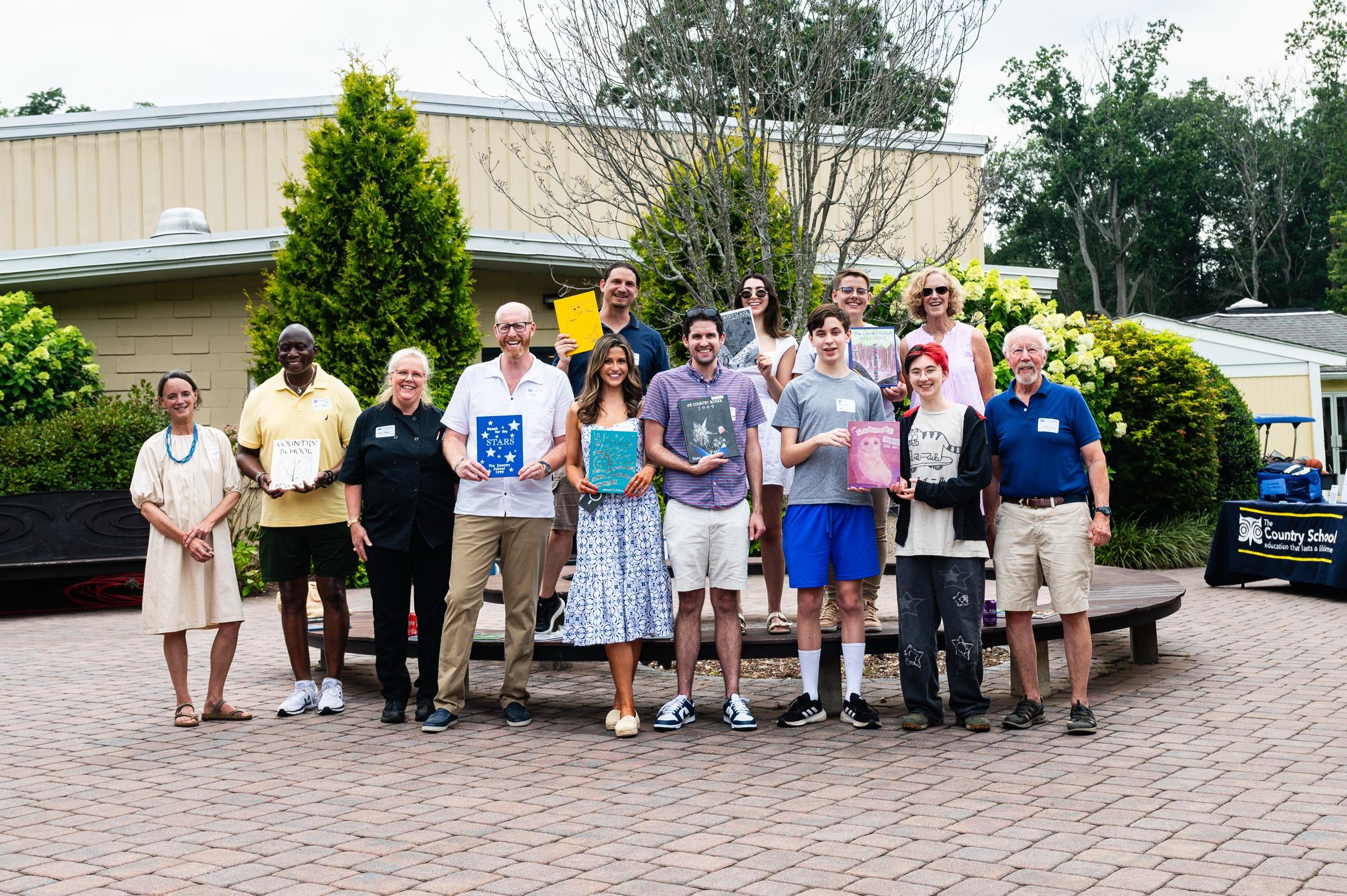
Proposed location of our Makerspace and Engineering Facility.
